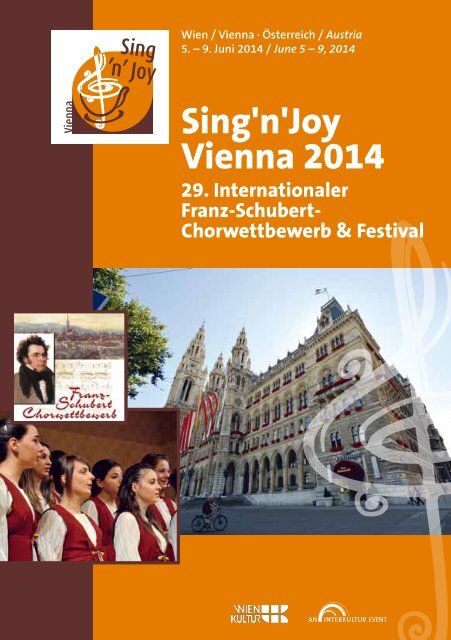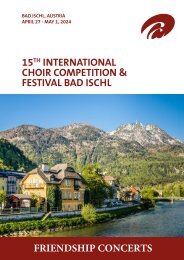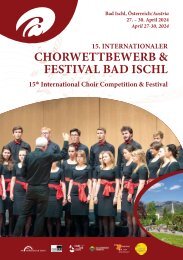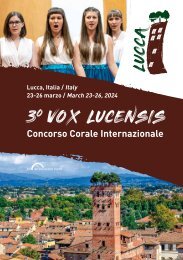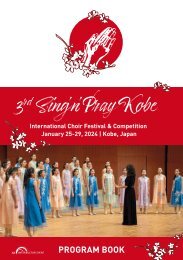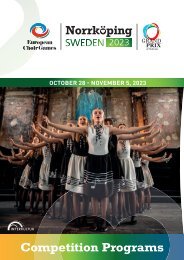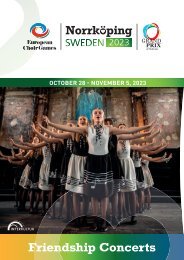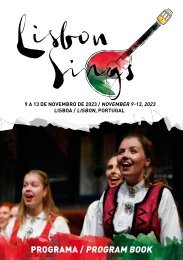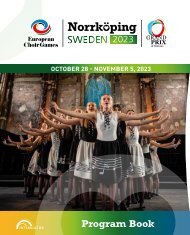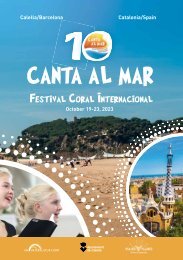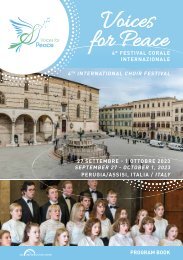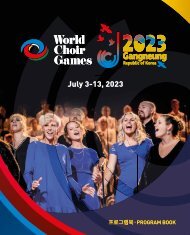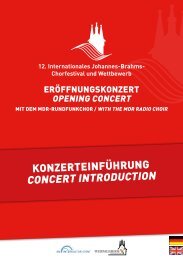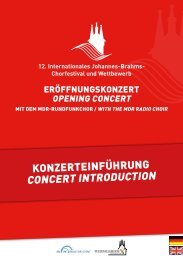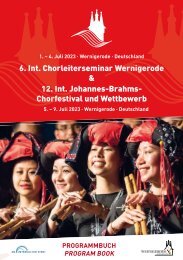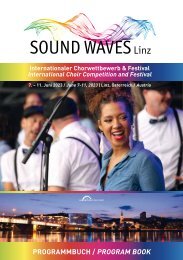Sing'n'Joy Vienna 2014 - Program Book
The Program Book of Sing’n’joy Vienna 2014 · 2nd Choirfestival & 29th International Franz Schubert Choir Competition.
The Program Book of Sing’n’joy Vienna 2014 · 2nd Choirfestival & 29th International Franz Schubert Choir Competition.
Create successful ePaper yourself
Turn your PDF publications into a flip-book with our unique Google optimized e-Paper software.
Wien / <strong>Vienna</strong> · Österreich / Austria<br />
5. – 9. Juni <strong>2014</strong> / June 5 – 9, <strong>2014</strong><br />
<strong>Sing'n'Joy</strong><br />
<strong>Vienna</strong> <strong>2014</strong><br />
29. Internationaler<br />
Franz-Schubert-<br />
Chorwettbewerb & Festival
2<br />
SING<br />
ALONG!
3<br />
<strong>Sing'n'Joy</strong> <strong>Vienna</strong><br />
29. Internationaler<br />
Franz-Schubert-Chorwettbewerb<br />
29 th International Franz Schubert Choir Competition<br />
5. – 9. Juni <strong>2014</strong>, Wien, Österreich<br />
June 5 – 9, <strong>2014</strong>, <strong>Vienna</strong>, Austria<br />
Eine INTERKULTUR Veranstaltung / An INTERKULTUR event<br />
Veranstalter / Organiser<br />
Förderverein INTERKULTUR e.V.<br />
Förderverein INTERKULTUR Österreich<br />
in Zusammenarbeit mit / in cooperation with<br />
Schubert-Gesellschaft Wien-Lichtental<br />
unterstützt von / supported by<br />
Stadt Wien / City of <strong>Vienna</strong><br />
Chorverband Österreich / Austrian Choral Association<br />
Ehrenschutz / Patronage<br />
Kardinal Dr. Christoph Schönborn · Erzbischof von Wien / Archbishop of <strong>Vienna</strong><br />
Dr. Michael Häupl · Bürgermeister der Bundeshauptstadt Wien /<br />
Mayor of the Federal Capital of <strong>Vienna</strong><br />
Ehrenpräsidium / Honorary Presidency<br />
DI Dr. Stefan Zapotocky · Präsident der /<br />
President of the Schubert-Gesellschaft Wien-Lichtental<br />
Regierungsrat Prof. Herbert Wild ·<br />
Ehrenpräsident des Österreichischen Chorverbandes /<br />
Honorary President of the Austrian Choral Association<br />
Veranstaltungsleitung / Competition Director<br />
Günter Titsch, Präsident / President INTERKULTUR<br />
Künstlerisches Komitee / Artistic Committee<br />
Prof. Mag. Friedrich Lessky (Österreich / Austria)<br />
Prof. Dr. Ralf Eisenbeiß (Deutschland / Germany)<br />
Christian Ljunggren (Schweden / Sweden)<br />
INTERKULTUR Board<br />
Günter Titsch (Deutschland / Germany)<br />
Wang Qin (China)<br />
Stefan Bohländer (Deutschland / Germany)<br />
Prof. Dr. Ralf Eisenbeiß (Deutschland / Germany)
5<br />
Inhalt / Table of contents<br />
Seite / Page<br />
Veranstalter / Organiser 3<br />
Inhaltsverzeichnis / Table of contents 5<br />
Teilnehmerländer / Participating Countries 6<br />
Grußworte / Greetings 8<br />
• Günter Titsch, Präsident / President INTERKULTUR<br />
• Dr. Michael Häupl, Bürgermeister der Bundeshauptstadt Wien /<br />
Mayor of the Federal Capital of <strong>Vienna</strong><br />
• Dipl. Ing. Dr. Stefan Zapotocky, Präsident der Schubert-Gesellschaft<br />
Wien-Lichtental / President of the Schubert Society <strong>Vienna</strong>-Lichtental<br />
Förderverein INTERKULTUR / About INTERKULTUR 16<br />
• Statistik / Statistics<br />
• Preisträger der bisherigen Wettbewerbe / Prize winners of the previous competitions<br />
• Gewinner des Franz-Schubert-Chorpreises 2012 /<br />
Winner of the Franz Schubert Choir Prize 2012<br />
Über Wien / About <strong>Vienna</strong> 28<br />
• Über Wien / About <strong>Vienna</strong><br />
• Schubertgesellschaft<br />
Künstlerisches Komitee und Jury / Artistic Committee and Jury 36<br />
• Ralf Eisenbeiß (Deutschland / Germany)<br />
• Friedrich Lessky (Österreich / Austria)<br />
• Christiane Fischer (Österreich / Austria)<br />
• Peter Habermann (Deutschland / Germany)<br />
• Andris Veismanis (Lettland / Latvia)<br />
Allgemeiner Ablauf / General Schedule 44<br />
• Abschlussveranstaltung und Preisverleihung / Closing & Award Ceremony<br />
Wettbewerb / Competition 52<br />
• Veranstaltungsorte / Venues<br />
• Wettbewerbe / Competitions<br />
Chöre / Choirs 66<br />
Impressum & Team / Imprint & Team 78
6<br />
Teilnehmerländer / Participating Countries<br />
China/Hongkong SAR<br />
Philippinen /<br />
Philippines<br />
Deutschland /<br />
Germany<br />
Rumänien /<br />
Romania<br />
Finnland /<br />
Finland<br />
Russland /<br />
Russia<br />
Irland /<br />
Ireland<br />
Schweden /<br />
Sweden<br />
Italien /<br />
Italy<br />
Serbien /<br />
Serbia<br />
Lettland /<br />
Latvia<br />
Slowenien /<br />
Slovenia<br />
Norwegen /<br />
Norway<br />
Türkei /<br />
Turkey<br />
Österreich /<br />
Austria
GruSSworte<br />
Greetings<br />
9
10<br />
Günter Titsch<br />
Präsident INTERKULTUR<br />
President INTERKULTUR<br />
Meine sehr geehrten Damen und Herren,<br />
liebe Freunde der Chormusik,<br />
bereits zum 29. Male darf ich Sie auch im Namen<br />
der Schubert-Gesellschaft Wien-Lichtental<br />
in der Musikmetropole Wien, herzlich willkommen<br />
heißen. Nicht zuletzt dank unserer Wiener<br />
Freunde hat sich diese hervorragende Veranstaltung<br />
über die Jahre zu einem Höhepunkt<br />
der internationalen Schubert Pflege im Chorgesang<br />
entwickelt und strahlt darüber hinaus<br />
immer wieder die geistige Globalität seiner<br />
genialen Musik aus. Ganz im Sinne unserer Ziele<br />
von INTERKULTUR „Singing together brings<br />
nations together“ ist der Internationale Franz-<br />
Schubert-Chorwettbewerb immer wieder ein<br />
Treffen zahlreicher Chöre vieler Nationen und<br />
somit wirklich ein repräsentatives Festival im<br />
Geiste Schuberts und der weltweiten Chorgemeinschaft.<br />
Zur diesjährigen Veranstaltung erwarten wir 18<br />
Chöre aus 14 Nationen. Diese Zahlen sind umso<br />
erfreulicher als in wenigen Wochen der von IN-<br />
TERKULTUR veranstaltete größte Chorwettbewerb<br />
der Welt, die 8. World Choir Games <strong>2014</strong>,<br />
in der Kulturhauptstadt Europas, Riga (Lett-<br />
land), stattfinden wird. Zu dieser Veranstaltung<br />
erwarten wir eine Rekordteilnehmerzahl von<br />
500 Chören aus 60 Ländern. Als Gründer von IN-<br />
TERKULTUR glaube ich, dass es keinen besseren<br />
Weg gibt, um internationale Verständigung zu<br />
fördern. Gewiss haben wir keine Möglichkeiten,<br />
mit unseren Liedern gegen die negativen und<br />
beunruhigenden Entwicklungen in der derzeitigen<br />
Weltpolitik anzusingen. Jedoch sind wir,<br />
die wir aus aller Herren Länder kommen, Botschafter<br />
des Friedens und das unabhängig von<br />
Weltanschauungen, religiösen Bindungen oder<br />
territorialen Grenzen.<br />
Wenn ich nach vorne schaue, dann freue ich<br />
mich bereits jetzt auf unser 30jähriges Jubiläum<br />
des Franz-Schubert-Chorwettbewerbs,<br />
welches wir im Mai 2016 mit einer weiteren<br />
großartigen Veranstaltung begehen werden.<br />
Im Rahmen unseres Wettbewerbs werden wir<br />
erstmals eine populäre INTERKULTUR „Sing<br />
mit“ Veranstaltung in das <strong>Program</strong>m einbinden,<br />
bei der nicht nur auf der Bühne gesungen<br />
wird, sondern hunderte Sängerinnen und Sänger<br />
im Saal gemeinsam eine Schubert Messe<br />
aufführen werden. Ich darf Sie zu dieser Veranstaltung<br />
bereits jetzt herzlich einladen.<br />
Ich wünsche Ihnen allen eine wunderschöne<br />
Zeit in Wien. Genießen Sie die Treffen mit den<br />
Chören und Musikliebhabern der verschiedensten<br />
Länder und helfen Sie, mit diesen<br />
Begegnungen gegenseitigen Respekt und das<br />
Verständnis füreinander weiter zu entwickeln.<br />
Allen aktiv Mitwirkenden am 29. Franz-Schubert-Chorwettbewerb<br />
wünsche ich gutes Gelingen<br />
und viel Erfolg.<br />
Günter Titsch<br />
Präsident INTERKULTUR
11<br />
Ladies and gentlemen,<br />
Dear friends of choir music,<br />
It is a great pleasure for me to welcome you –<br />
also on behalf of the Schubert-Gesellschaft<br />
Wien-Lichtental and already for the 29 th time –<br />
to the renowned music capital of <strong>Vienna</strong>. Over<br />
the years and not least thanks to our Viennese<br />
friends, this outstanding music event has become<br />
a veritable international highlight, attending<br />
to the Schubert heritage of choir music,<br />
keeping it alive, and time and again radiating<br />
the timeless, global genius of his music. Striking<br />
the same tone like the INTERKULTUR motto,<br />
namely that “Singing together brings nations<br />
together“, the International Franz Schubert<br />
Choir Competition has become part and parcel<br />
of the world of choral music, bringing together<br />
numerous choirs from around the world to celebrate<br />
a festival here in <strong>Vienna</strong> that unites lovers<br />
of music in the spirit of Franz Schubert and his<br />
magnificent music.<br />
For this year’s event we are expecting a total<br />
of 18 choirs from 14 nations. These figures are<br />
indeed delightful, all the more so since in just<br />
a few weeks the biggest international choir<br />
competition of the world organised by INTER-<br />
KULTUR, the 8 th World Choir Games <strong>2014</strong>, will<br />
take place in Riga, Latvia, the European Capital<br />
of Culture <strong>2014</strong>, for which we expect a record<br />
number of 500 participating choirs from 60<br />
countries. As the founder and president of IN-<br />
TERKULTUR, it is my firm belief that there is no<br />
better way to promote international exchange<br />
and understanding. Most certainly, we have no<br />
means to counter - by our singing -all the disquieting<br />
political developments currently found<br />
in many places on our globe. However, and I<br />
would like to emphasize this point: We, the people<br />
that have come here from around the world,<br />
we are all messengers of peace, and we deliver<br />
our message independently of any particular<br />
ideological and religious beliefs and regardless<br />
of any frontiers and territorial divides.<br />
When I look ahead, I am already looking forward<br />
to our 30th anniversary of the Franz Schubert<br />
Choir Competition, a highlight we are going<br />
to celebrate in May 2016 with yet another<br />
superb event. For the first time in the history of<br />
the Franz Schubert Choir Competition in <strong>Vienna</strong><br />
we are going to include into programme of our<br />
competition one of the ever so popular INTER-<br />
KULTUR “Sing-along” events. In this event, music<br />
and singing will not only be presented onstage,<br />
but hundreds of singers spread all over the auditorium<br />
will be performing a Schubert mass<br />
together with the protagonists on the stage. It<br />
is a great pleasure for me to invite you to this<br />
fabulous event already today.<br />
I wish a wonderful time in <strong>Vienna</strong> to all of you.<br />
Go out and enjoy the performances and encounters<br />
with the choirs and the lovers of music<br />
coming to the Austrian capital to celebrate this<br />
event. And contribute your share to the idea of<br />
mutual respect and fostering understanding. I<br />
wish good luck and success to all participants<br />
joining this 29 th Franz Schubert Choir Competition.<br />
Günter Titsch<br />
President INTERKULTUR
12<br />
Dr. Michael Häupl<br />
Bürgermeister der Bundeshauptstadt Wien /<br />
Mayor of the Federal Capital of <strong>Vienna</strong><br />
Das reiche Spektrum kultureller Angebote<br />
macht Wien zu einer der führenden Kulturmetropolen<br />
der Welt. Die österreichische<br />
Bundeshauptstadt gilt vor allem als Welthauptstadt<br />
der Musik. Zum einem sind es<br />
die vielen Komponisten und Musiker, die in<br />
Wien im Laufe der vergangenen Jahrhunderte<br />
gelebt und gewirkt haben. Zum anderen<br />
sind es die Wiener Institutionen mit<br />
ihrer großen Tradition, die diesen Ruf dauerhaft<br />
lebendig erhalten und in die ganze<br />
Welt hinaustragen: Der Bogen reicht vom<br />
weltberühmten Klangkörper der Wiener<br />
Philharmoniker über die Wiener Sängerknaben<br />
bis zu den einzigartigen Aufführungsstätten<br />
wie Musikverein, Konzerthaus oder<br />
Staatsoper.<br />
Der internationale Franz-Schubert-Chorwettbewerb<br />
findet heuer zum 29. Mal statt<br />
und ist zu einer festen Institution geworden.<br />
Ich heiße die Gäste aus dem In- und Ausland<br />
herzlich in der österreichischen Bundeshauptstadt<br />
willkommen und wünsche Ihnen<br />
viel Erfolg sowie Freude am Singen!<br />
Dr. Michael Häupl
13<br />
<strong>Vienna</strong>’s diverse range of cultural life makes<br />
it one of the world’s leading cultural metropolises.<br />
Above all, the Austrian federal capital<br />
is considered the world capital of music. One<br />
the on hand, there is the great number of<br />
composers and musicians who chose <strong>Vienna</strong><br />
as their place to live and work in the course<br />
of the last centuries. And on the other hand,<br />
there are the Viennese institutions which,<br />
with their outstanding traditions, have been<br />
continuously contributing to the city’s reputation,<br />
keeping it alive and making it famous<br />
around the globe.<br />
This rich spectrum reaches from the world<br />
–renowned <strong>Vienna</strong> Philharmonic Orchestra<br />
and the <strong>Vienna</strong> Boys’ Choir to the matchless<br />
concert venues such as the Musikverein, the<br />
Konzerthaus and the <strong>Vienna</strong> State Opera.<br />
Taking place for the 29 th time this year, the<br />
International Franz Schubert Choir Competition<br />
has become a veritable institution in<br />
<strong>Vienna</strong>.<br />
I would like to welcome all guests from Austria<br />
and abroad to the Austrian federal capital<br />
and I wish all of you every success and singing<br />
pleasure!<br />
Dr. Michael Häupl
14<br />
Dipl. Ing.<br />
Dr. Stefan Zapotocky<br />
Präsident der Schubert-Gesellschaft<br />
Wien-Lichtental / President of the Schubert<br />
Society <strong>Vienna</strong>-Lichtental<br />
Sehr geehrte Teilnehmer,<br />
Freunde und Gäste des Internationalen<br />
Franz-Schubert-Chorwettbewerbes <strong>2014</strong> in<br />
Wien!<br />
Unsere Schubert-Gesellschaft Wien-Lichtental<br />
feiert heuer das 30. Jahr ihres Bestehens.<br />
Ausgehend von der Gründungsidee unseres<br />
unvergessenen Pfarrers und Ehrenpräsidenten<br />
Dr. Paul Varga haben wir uns seither<br />
intensiv bemüht, das große musikalische<br />
Schaffen Franz Schuberts am Ort seines<br />
Entstehens in seinen vielen Dimensionen zu<br />
pflegen.<br />
Neben dem kirchenmusikalischen Werk, seinen<br />
Liedern, Sinfonien und der Kammermusik<br />
ist es vor allem die Chormusik, die uns<br />
ein besonderes Anliegen ist.<br />
Ich danke Ihnen allen für Ihre Teilnahme und<br />
Mitwirkung, den Organisatoren unseres<br />
Partners INTERKULTUR für ihre intensive<br />
Arbeit zur Vorbereitung und Durchführung<br />
dieses großen musikalischen Ereignisses.<br />
Möge auch dieser Wettbewerb neue Freude<br />
an der Musik Franz Schuberts aber auch<br />
anderer Meister bringen und erleben lassen<br />
und Ihnen allen zu einem unvergesslichen<br />
Erlebnis werden!<br />
Allen Sängerinnen und Sängern wünsche<br />
ich viel Freude und den verdienten Erfolg!<br />
Dr. Stefan Zapotocky
15<br />
Ladies and Gentlemen,<br />
dear participants, friends and supporters of the<br />
International Franz Schubert Choir Competition<br />
<strong>2014</strong> in <strong>Vienna</strong>,<br />
Our Wien-Lichtental Schubert Society is celebrating<br />
its thirtieth anniversary this year.<br />
Inspired by the founding idea of our unforgettable<br />
honorary president, Father Dr Paul Varga, we<br />
have striven all these years to foster and uphold<br />
Franz Schubert’s monumental musical work<br />
right at the place of its creation, and in all its<br />
dimensions.<br />
Beside his church music, the Lieder, the symphonies<br />
and the chamber music, it is above all the<br />
choir music which is our special concern.<br />
My thanks go to all of you for participating and<br />
collaborating, and to our partners in INTERKUL-<br />
TUR for their sterling work in preparing and organising<br />
this great music event.<br />
May this competition generate renewed joy in<br />
Schubert’s music and other masters, and may it<br />
prove a memorable experience for all.<br />
I wish all the singers an enjoyable and successful<br />
competition!<br />
Dr Stefan Zapotocky
Förderverein INTERKULTUR<br />
About Interkultur<br />
17
18<br />
… Brücken der Begegnung<br />
Mit dem 1. Internationalen Chorwettbewerb Budapest im Jahre 1988 war der Anfang für eine<br />
der größten und erfolgreichsten kulturellen Veranstaltungsreihen in Europa gemacht. Der Name<br />
dieser neuartigen Chorwettbewerbe und Festivals, INTERKULTUR Veranstaltungsreihen, ist mittlerweile<br />
in der ganzen Welt durch das hohe künstlerische und organisatorische Niveau bekannt.<br />
INTERKULTUR ist zu einem Begriff in der Welt der Chorbegeisterten geworden und die weltweite<br />
Gemeinschaft um seine Wettbewerbe wächst.<br />
Organisiert werden diese Veranstaltungen vom gemeinnützigen Förderverein INTERKULTUR e. V.,<br />
dessen bislang größter Erfolg es war, die Olympische Idee auf die Chormusik zu übertragen. Die<br />
Chorolympiade 2000 in Linz (Österreich) war der Beginn einer chorolympischen Bewegung. Ihre<br />
Erfolgsgeschichte setzte sich 2002 in Busan (Korea), 2004 in Bremen fort. Und ab 2006 als World<br />
Choir Games in Xiamen (China), 2008 in Graz (Österreich) und 2010 in Shaoxing (China). Im Juli<br />
2012 fanden die World Choir Games erstmals auf dem amerikanischen Kontinent, in Cincinnati,<br />
Ohio statt. Im Jahr <strong>2014</strong> werden sie nach Riga, Lettland kommen und damit erneut zurück nach<br />
Europa.<br />
Ein weiterer Meilenstein in der Geschichte von INTERKULTUR war die Einführung der Weltmeisterschaft<br />
der Chöre. Die erste Weltmeisterschaft fand 2009 in der Provinz Gyeongnam in Südkorea<br />
statt, im Juli 2011 wurde die Chorweltmeisterschaft der Jugend in Graz (Österreich) ausgetragen.<br />
Graz war im Juli 2013 mit den 1. European Choir Games und dem Songs of Spirit Festival<br />
noch einmal Austragungsort für eine INTERKULTUR-Veranstaltung.<br />
Die Idee<br />
INTERKULTUR ist mittlerweile zum Symbol für eine einzigartige künstlerische Idee geworden.<br />
Sie besteht in einer neuen Auffassung über die Durchführung von Chorwettbewerben: Während<br />
sich bei den verdienstvollen traditionellen Chorwettbewerben nur Chöre vergleichen, die zur internationalen<br />
Spitzenklasse gehören, stehen die INTERKULTUR – Wettbewerbe allen Chören, mit<br />
oder ohne Wettbewerbserfahrung offen. Alle Chöre der Welt können sich im Wettbewerb entsprechend<br />
ihrem Leistungsstand vergleichen. Für das künstlerische Komitee liegen die Schwerpunkte<br />
auf Qualität aber auch auf größter Vielfalt der Chöre in allen Wettbewerben. Diese neue<br />
Art der Wettbewerbsorganisation hat in den letzten Jahrzehnten zahlreiche Nachahmer gefunden.<br />
Mit der Idee der World Choir Games, die alle zwei Jahre stattfinden, hat es INTERKULTUR geschafft<br />
der nationalen und internationalen Chorszene neue Impulse und Perspektiven zu geben.
19<br />
Das pädagogische Konzept<br />
Die INTERKULTUR – Veranstaltungen sind nicht nur Wettbewerbe und internationale Chortreffen,<br />
sondern stehen auch für Kompetenz durch zahlreiche pädagogische Angebote, die für eine<br />
nachhaltige Wirkung bei den teilnehmenden Chören sorgen. So können sich Chöre beispielsweise<br />
in Beratungsrunden vor dem Wettbewerb und in intensiven Gesprächen mit der internationalen<br />
Jury wertvolle Hinweise zu ihrem derzeitigen Leistungsstand geben lassen, fachkundige pädagogische<br />
und künstlerische Hinweise erhalten oder Ratschläge zur Interpretation bekommen.<br />
Weitere exklusive Möglichkeiten, dem eigenen Chorsingen neue Impulse zu verleihen, bestehen<br />
in Proben mit internationalen Chorfachleuten.<br />
Außerdem werden bei vielen INTERKULTUR – Veranstaltungen Fachtagungen, Chorleiterseminare,<br />
Komponistenporträts und Fachvorträge angeboten. Freundschaftskonzerte und gemeinsames<br />
Singen verstärken die große emotionale Wirkung der internationalen Chortreffen des<br />
Fördervereins INTERKULTUR e. V.<br />
Das Qualitätssiegel<br />
Seit über 20 Jahren ist MUSICA MUNDI® das exklusive Qualitätssiegel aller INTERKULTUR – Wettbewerbe.<br />
Seit dem ersten Wettbewerb, den INTERKULTUR 1988 in Budapest veranstaltet hat,<br />
besteht ein Bewertungssystem, das als Basis für alle INTERKULTUR – Wettbewerbe dient. Dieses<br />
System wird regelmäßig überarbeitet und ständig weiter entwickelt. Es garantiert Vergleichbarkeit<br />
zwischen allen Wettbewerben und setzt einen Standard in der Welt der Chormusik.<br />
Die Wettbewerbe<br />
Es gibt verschiedene Kategorien für alle Arten und Stufen der Chöre in verschiedenen Schwierigkeitsgraden,<br />
mit und ohne Pflichtstück. Sie bieten eine einzigartige Atmosphäre, gute Wettbewerbsbedingungen,<br />
intensive künstlerische Kontakte, unterschiedliche Beratungsprogramme<br />
und Workshops, sowie Praxis mit internationalen Künstlern. Mehr als 200 Experten und führende<br />
Chordirigenten aus der ganzen Welt gewährleisten ein hohes Maß an Kompetenz in allen<br />
INTERKULTUR-Veranstaltungen.<br />
Das Wertungssystem<br />
Die Jury vergibt Goldene, Silberne und Bronzene Diplome in 10 Stufen bei INTERKULTUR – Wettbewerben<br />
und Bronzene, Silberne oder Goldene Medaillen bei den World Choir Games und den<br />
World Choir Championships nach dem MUSICA MUNDI® Bewertungssystem. In jeder Kategorie<br />
gibt es einen Sieger oder Champion, herausragende Leistungen werden mit besonderen Preisen<br />
geehrt. In manchen Wettbewerben gibt es zusätzliche Wettbewerbe der Kategoriesieger um den<br />
Großpreis, hier wird dann der Gesamtsieger des Wettbewerbs bestimmt.<br />
Die Wettbewerbs- und Festivalorte<br />
Die Veranstaltungen von INTERKULTUR fanden bisher in folgenden Ländern statt: Deutschland,<br />
Indonesien, Israel, Italien, Malaysia, Malta, Österreich, Republik Korea, Spanien, Schweden, Tschechische<br />
Republik, Ungarn, USA, Vietnam und in der Volksrepublik China. Im Herbst <strong>2014</strong> findet<br />
erstmalig eine Veranstaltung in Serbien statt.
20<br />
Die Teilnehmer<br />
Über 7.000 Chöre mit mehr als 300.000 aktiven Sängerinnen und Sängern aus 100 Ländern nahmen<br />
bisher an den INTERKULTUR – Wettbewerben teil. Mehr als die Hälfte der Teilnehmer sind<br />
junge Menschen im Alter bis 25 Jahre.<br />
Die Fördermöglichkeiten<br />
Gemäß seiner Satzung unterstützt der Förderverein INTERKULTUR e.V. folgende Aktivitäten:<br />
Internationale Musikfestivals und Chorwettbewerbe, die das Ziel verfolgen, Chöre aus unterschiedlichen<br />
Regionen der Welt zusammenzubringen und in gegenseitiger Achtung internationale<br />
Zusammenarbeit zu pflegen sowie zum Austausch der Kulturen und der Verständigung<br />
zwischen den Völkern beizutragen;<br />
• Kinder- und Jugendchöre, besonders aus finanzschwachen Ländern;<br />
• Laienchöre aus dem In- und Ausland, die eine intensive und nachhaltige Jugendarbeit<br />
nachweisen können;<br />
• Nachwuchschorleiter, junge Musiker und Sänger (Vergabe von Stipendien);<br />
• zweckgebundene Förderprogramme.<br />
KulturPreis Europa<br />
Der Förderverein Interkultur e.V. wurde im Jahr 2006 mit dem KulturPreis Europa ausgezeichnet,<br />
der vom deutschen Bundesaußenminister a. D. Hans Dietrich Genscher initiiert wurde und vom<br />
KulturForum Europa präsentiert wird. In der Begründung zu dieser Ehrung heißt es, INTERKUL-<br />
TUR gebe den Choren aus aller Welt die Gelegenheit, sich im friedlichen Wettstreit unter dem<br />
Motto „Kultur schafft Toleranz – Frieden stiften mit Kultur“ zu treffen.<br />
… Connecting Bridges<br />
The first INTERKULTUR International Choir Competition in Budapest, held in 1988, was the start of one<br />
of the largest and most successful series of cultural events in Europe. The INTERKULTUR Event Series has<br />
meanwhile become known throughout the world for its high artistic and organizational standards<br />
and as a concept for the choirs and choir enthusiasts worldwide. These events are organized by INTER-<br />
KULTUR, a non-profit organization based in Germany.<br />
INTERKULTUR´s biggest success to date was to bring the antique Olympic idea to the choral commu-
21<br />
nity. The Choir Olympics 2000 in Linz, Austria was the beginning of a Choir Olympic movement, with<br />
subsequent events in Busan, Republic of Korea in 2002, and Bremen, Germany in 2004. This success<br />
continued as the “World Choir Games” in Xiamen, China in 2006, Graz, Austria in 2008, Shaoxing,<br />
China in 2010, and Cincinnati, USA in 2012. In <strong>2014</strong>, the World Choir Games will be held in Riga, Latvia.<br />
Another milestone in the history of INTERKULTUR was to establish a World Championship for choirs.<br />
The first World Choir Championships debuted in 2009 in the Province of Gyeongnam, Republic of Korea,<br />
followed by the World Choir Championships for Youth and Young Adults in July 2011 in Graz, Austria.<br />
Graz again was the host city for a INTERKULTUR event, the first European Choir Games and the<br />
“Songs of Spirit Festival” were held in July 2013.<br />
The Idea<br />
INTERKULTUR has become the symbol for a unique artistic idea, consisting of a new interpretation<br />
concerning the execution of choir festivals. In comparison to traditional meritorious choir competitions<br />
that only invite international elite choirs to take part, the INTERKULTUR competitions are open to<br />
all non-professional choirs. Choirs from all over the world, interested in gaining international festival<br />
and competition experience, can compete according to their level of artistic achievement. The Artistic<br />
Committee puts emphasis on the presence of the highest level of choral performers as well as on the<br />
presence of the greatest diversity of choirs in all competitions. This new type of competition has been<br />
copied by numerous organizations in the past two decades. With the idea to organize the World Choir<br />
Games, formerly known as “Choir Olympics” biennially, INTERKULTUR has opened a door to new impulses<br />
and perspectives for the national and international choral movement.<br />
The Pedagogical Concept<br />
INTERKULTUR events are not just competitions and international choir festivals. Choirs are able to<br />
receive feedback from various pedagogical offerings. In evaluation rounds, choirs have the chance to<br />
work with international jury members and gain advice on their current level of achievement, receive<br />
proficient pedagogical and artistic information and obtain suggestions as to how to interpret the chosen<br />
piece. Choirs may also attend workshops and seminars along with participation in Friendship and<br />
Celebration Concerts which allow international choirs to interact with choirs of the host city during<br />
INTERKULTUR events.<br />
The Quality Seal<br />
For more than 20 years, MUSICA MUNDI® has been the exclusive quality seal for all INTERKULTUR<br />
events worldwide. The rating system on which all INTERKULTUR competitions are based upon since the<br />
first event in Budapest in 1988 have been improved continuously. MUSICA MUNDI® ensures comparability<br />
among all events, a smooth organization and has set standards in the world of choral music.
22<br />
The Competitions<br />
There are various categories for all types and levels of choirs in different degrees of difficulty, with or without<br />
compulsory pieces. The competitions offer good competitive conditions, valuable artistic contacts,<br />
various workshops and seminars, as well as practice opportunities with international performers. More<br />
than 200 experts and leading choirmasters from all over the world guarantee a high level of expertise<br />
in all INTERKULTUR events.<br />
Evaluation System<br />
The jury awards Bronze, Silver, and Gold Diplomas on 10 levels at INTERKULTUR competitions along<br />
with Bronze, Silver and Gold Medals at the World Choir Games and World Choir Championships, according<br />
to the MUSICA MUNDI® evaluation system. In each category, a winner or champion is determined<br />
and outstanding achievements are honored with special prizes. In some competitions there is a<br />
grand prize competition of the category winners which determines the overall winner of the competition.<br />
Locations of Festivals and Competitions<br />
To date, INTERKULTUR events have taken place in Austria, Czech Republic, Germany, Hungary, Indonesia,<br />
Israel, Italy, Malaysia, Malta, People’s Republic of China, Republic of Korea, Spain, Sweden, USA and<br />
Vietnam. In fall <strong>2014</strong> a new choral event takes place in Serbia for the first time.<br />
The Participants<br />
In total, more than 7,000 choirs with over 300,000 active singers from 100 countries have taken part in<br />
the INTERKULTUR competitions to date. An interesting note is that more than half of the participants<br />
have been children and youth up to 25 years of age.<br />
Means of Support<br />
In accordance with its statutes, INTERKULTUR supports the following activities:<br />
• International music festivals and choir competitions whose goal is to bring together choirs from different<br />
regions of the world and encourage international collaboration through mutual respect, as well<br />
as to contribute to cultural exchange and understanding among nations<br />
• Children and youth choirs even from financially challenged countries<br />
• Non-professional choirs that focus on the growth of youth development<br />
• Young, talented choirmasters, young musicians and singers through the support of scholarship<br />
awards<br />
• Specific sponsorship opportunities<br />
European Culture Award<br />
INTERKULTUR was awarded the 2006 European Culture Award, by former German Minister of Foreign<br />
Affairs, Hans Dietrich Genscher and presented by KulturForum Europa, for its activities on behalf of<br />
understanding between peoples and furtherance of common European thinking in the field of culture.
24<br />
Statistik / Statistics<br />
Place / Country Year Nations Choirs Gold Silver Bronze<br />
Budapest (H) 2007 21 50 19 26 5<br />
Linz (A) 2007 14 17 16 5 1<br />
Rome (I) 2007 9 18 9 9 2<br />
Wernigerode (D) 2007 17 40 20 11 –<br />
Venice (I) 2007 12 14 10 5 –<br />
In Canto sul Garda (I) 2007 18 37 24 15 1<br />
Malta (M) 2007 14 18 14 10 –<br />
Jakarta (RI) 2007 12 135 41 71 22<br />
<strong>Vienna</strong> (A) 2007 14 17 16 9 1<br />
Concorso Corale (I) 2008 13 33 25 12 2<br />
Graz (A) 2008 93 441 232 322 46<br />
Venice (I) 2008 17 32 22 16 3<br />
<strong>Vienna</strong> (A) 2008 17 26 22 15 1<br />
Budapest (H) 2009 14 46 24 21 5<br />
Venice (I) 2009 17 31 27 16 1<br />
Linz (A) 2009 12 21 11 7 3<br />
Rome (I) 2009 7 11 7 5 –<br />
Gyeongnam (ROK) 2009 32 165 53 53 4<br />
Wernigerode (D) 2009 14 25 16 11 1<br />
In Canto sul Garda (I) 2009 20 35 24 25 3<br />
Malta (M) 2009 10 19 18 5 –<br />
<strong>Vienna</strong> (A) 2009 11 18 17 9 –<br />
Concorso Corale (I) 2010 13 38 24 16 4<br />
Venice (I) 2010 14 20 19 9 –<br />
Kuala Lumpur (I) 2010 6 13 8 4 –<br />
Shaoxing (PRC) 2010 83 472 140 250 60<br />
Zwickau (D) 2010 7 22 14 7 –<br />
St Louis (USA) 2010 7 17 10 4 –<br />
<strong>Vienna</strong> (A) 2010 15 16 15 7 –<br />
H ộ i An (VN) 2011 8 31 17 18 3
25<br />
Place / Country Year Nations Choirs Gold Silver Bronze<br />
Budapest (H) 2011 11 52 29 19 5<br />
Venice (I) 2011 16 24 22 10 –<br />
Reno (USA) 2011 4 19 11 10 _<br />
Linz (A) 2011 14 20 14 10 1<br />
Rome (I) 2011 12 18 11 8 3<br />
Wernigerode (D) 2011 14 42 28 16 2<br />
Graz (A) 2011 40 120 53 52 6<br />
In Canto sul Garda (I) 2011 16 43 30 27 1<br />
Malta (M) 2011 7 15 11 7 –<br />
Concorso Corale (I) 2012 15 38 33 7 1<br />
Venice (I) 2012 19 37 37 11 –<br />
<strong>Vienna</strong> (A) 2012 17 33 26 17 5<br />
Cincinnati (USA) 2012 64 362 149 224 43<br />
Calella (E) 2012 28 70 35 46 3<br />
Guangzhou (PRC) 2012 43 164 47 63 11<br />
Huê´ (VN) 2012 5 19 16 9 –<br />
Budapest (H) 2013 20 62 38 30 4<br />
Venedig (I) 2013 17 26 32 4 –<br />
Linz (A) 2013 14 22 23 7 1<br />
H ộ i An (VN) 2013 7 15 12 6 –<br />
Rome (I) 2013 14 21 19 11 –<br />
Graz (A) 2013 35 72 39 34 6<br />
Wernigerode (D) 2013 18 44 29 18 3<br />
Toruń (PL) 2013 8 16 13 9 –<br />
In...Canto Sul Garda (I) 2013 18 36 24 22 4<br />
Manado (RI) 2013 10 140 75 100 10<br />
Calella/Barcelona (E) 2013 19 41 29 20 4<br />
Malta (M) 2013 18 33 22 19 –<br />
Louisville (USA) 2013 2 18 10 8 1<br />
Manila (RP) 2013 3 45 36 23 1<br />
Málaga (E) <strong>2014</strong> 12 16 8 13 1
26<br />
Preisträger der bisherigen Wettbewerbe<br />
Prize winners of the previous competitions<br />
1984 Vocal-Ensemble Trageser, Deutschland / Germany<br />
University Choir Helsinki, Finnland / Finland<br />
1985 Ensemble Vocal F.L. van Parys, Frankreich / France<br />
Bundesbahn-Männerchor Flügelrad, Wuppertal, Deutschland / Germany<br />
1986 Coro A. Illersberg, Italien / Italy<br />
Amici Cantus, Finnland / Finland<br />
1987 nicht vergeben / not awarded<br />
1988 Chorus Viennensis, Österreich / Austria<br />
Tallinna Polütehninlisi Instituudi, Akadeemiline Meeskoor, Estland<br />
1989 Choer des XVI, Friburg, Schweiz / Switzerland<br />
1990 Mariachören, Västeras, Schweden / Sweden<br />
1991 Tallinna Technikaülikooli Kammerkoor, Estland<br />
1992 Chamber Choir "Collegium Musicum", Olsztyn, Polen / Poland<br />
1993 Chamber Choir "Hortus Musicus", Feldkirch, Österreich / Austria<br />
1994 Akademski Pevsli Zbor "Tone Tomsic", Lubljana, Slowenien / Slovenia<br />
1995 "Cappella Transylvanica", Cluj, Rumänien / Romania<br />
1996 Mixed Choir "Coro de camara Adrogue", Buenos Aires, Argentinien / Argentina<br />
Female Choir "Vaiva", Talsi, Lettland / Latvia<br />
Male Choir: "Choer des armeillis de la Gruyére", Charmey, Schweiz / Switzerland<br />
1997 Ex aequo Kyoto Kayadani female choir, Kyoto, Japan<br />
Embla, Trondheim, Norwegen / Norway<br />
1998 Trondheim Chamber Choir, Norwegen / Norway<br />
Frauenchor der Lettischen Akademie, Riga, Lettland / Latvia<br />
1999 Mixed Choir Vokalna Skupina Canticum, Maribor, Slowenien / Slovenia<br />
Female Choir Kyoto Kayadani, Japan<br />
2000 Mixed Choir of the University Danzig, Polen / Poland<br />
Female Choir Cantairí Óga Átha Cliath Dublin, Republik Irland / Republic of Ireland<br />
2001 Mixed Choir Obala, Koper, Slowenien / Slovenia<br />
Female Choir Kyoto Kayadani, Kyoto, Japan<br />
2002 Mixed Choir: Madrigalchor Szekszárd, Ungarn / Hungary<br />
Female Choir "La Vocaletta", Österreich / Austria<br />
2003 Mixed Choir Copenhagen Oratorio Choir, Dänemark / Denmark<br />
Female Youth Choir "Koraly", Vyshgorod, Ukraine<br />
Male Choir MGV Liederkranz 1850, Niederzeuzheim, Deutschland / Germany
27<br />
2004 Mixed Chamber Choir Kammerchor AVE, Slowenien / Slovenia<br />
Female Choir Kyoto Kayadani Frauenchor, Kyoto, Japan<br />
2005 Akademischer Chor des Polytechnikums Slaskiej Gliwice ,Polen / Poland<br />
"Resurrexit", Absolventinnenchor der Ursulinen Graz, Österreich / Austria<br />
Male Choir Neustift, Südtirol / South Tyrol<br />
2006 Foerster Female Chamber Choir Prague,Tschechien / Czech Republic<br />
2007 Franz Schubert Choir Prize: Brianski Akademitsheski Kor, Russland / Russia<br />
2008 Franz Schubert Choir Prize: Kammerchor am Würzburger Dom, Deutschland / Germany<br />
2009 Franz Schubert Choir Prize: Coro Polifonico di Ruda, Italien / Italy<br />
2010 Franz-Schubert-Choir Prize: Klangscala, Österreich / Austria<br />
2012 Franz Schubert.Choir Prize: Cantate, Ungarn / Hungary<br />
Gewinner des Franz-Schubert-Preises-Chorpreises 2012<br />
Winner of the Franz Schubert Choir Prize 2012<br />
Cantate<br />
Ungarn / Hungary<br />
Gegründet / Founded: 1996<br />
Dirigent / Conductor: Ferenc Sapszon jr.
Über Wien<br />
About <strong>Vienna</strong><br />
29
30<br />
Über Wien / About <strong>Vienna</strong><br />
Wien<br />
Wien ist Bundeshauptstadt und zugleich das kleinste der neun Bundesländer Österreichs. Im<br />
Herzen Europas an der Donau, an den nordöstlichen Ausläufern der Alpen, liegt Wien historisch<br />
gesehen an einem Schnittpunkt von Kulturen und Verkehrswegen, an der einstigen Bernsteinstraße<br />
und der Donau. Das Stadtgebiet ist in 23 Bezirke gegliedert, umfasst 415 km² und wird<br />
von über 1,7 Millionen Menschen bewohnt.<br />
Kulturmetropole Wien<br />
Der hohe Stellenwert, den man hier der Kunst stets einräumte, förderte zu jeder Zeit die heimische<br />
Kreativität und zog Menschen aus der ganzen Welt an. 50 Theater, vier Opernhäuser und<br />
mehrere Musical-Bühnen, über 150 Museen, zahlreiche Galerien sowie renommierte Theater-,<br />
Musik- und Tanz-Festivals hat Wien unter anderem seinen Gästen zu bieten. All dies sorgt das<br />
ganze Jahr über für ein außerordentlich dichtes <strong>Program</strong>m und macht die Stadt zu einer der führenden<br />
Unterhaltungs- und Kulturmetropolen Europas.<br />
Wien – Stadt der Musik<br />
Besonderen internationalen Ruf genießt Wien als Stadt der Musik. An keinem anderen Ort der<br />
Welt haben so viele Komponisten von Weltgeltung gelebt: von den hier geborenen wie etwa<br />
Schubert, Strauß, Schönberg oder Berg bis zu jenen, denen Wien Heimat war, wie Mozart, Beethoven,<br />
Haydn, Brahms, Mahler u. v. a.<br />
Die Wiener Philharmoniker zählen zur Weltspitze, ihnen eifern die Wiener Symphoniker und eine<br />
Reihe weiterer Wiener Orchester nach. Die Wiener Staatsoper gehört international zu den führenden<br />
Häusern, außer ihr beherbergt die Stadt noch drei weitere Opernbühnen (Theater an der<br />
Wien, Volksoper, Kammeroper).<br />
Die Wiener Sängerknaben begeistern Musikfreunde rund um den Globus. Mit dem 2012 eröffneten<br />
„MuTh“ haben die berühmtesten singenden Kinder der Welt einen sensationellen Konzertsaal<br />
gleich neben ihrer Wohn- und Ausbildungsstätte im Augarten.<br />
Als besonderes Musikerlebnis werden im „Haus der Musik“ – einer mit modernster Hightech<br />
ausgestatteten Erlebniswelt zum Phänomen Musik – auf 2000 m² Klänge sichtbar, Orgelpfeifen<br />
begehbar und Besucher zu virtuellen Dirigenten oder Komponisten. Eine weitere Attraktion ist<br />
die Erlebniswelt Mozarthaus <strong>Vienna</strong>, die am 27. Jänner 2006 – Mozarts 250. Geburtstag – in<br />
seinem ehemaligen Wohnhaus in der Domgasse eröffnet wurde.
31<br />
Wiener Lifestyle: k. und k. Nostalgie und aktuelle Trends<br />
Das Nebeneinander von Traditionellem wie etwa dem Kaffeehaus und dem Heurigen, die Wiens<br />
genießerische Gelassenheit ausstrahlen, und Topaktuellem wie international renommierten<br />
Szene-Events, vom Life Ball bis zum Festival für elektronische Musik, vermittelt das Lebensgefühl,<br />
das Touristen heute suchen: ein Angebot, bei dem man jederzeit nach Laune zwischen Ruhe und<br />
Beschaulichkeit oder Action und Stimulation wählen kann.<br />
Rund um den Naschmarkt, Wiens multikulturellem Obst- und Gemüsemarkt, samstags noch um<br />
einen Flohmarkt erweitert, hat sich zum Beispiel eine vielfältige Gastronomieszene entwickelt.<br />
Die Mariahilfer Straße – Direktverbindung zwischen der historischen Altstadt und dem Schloss<br />
Schönbrunn – hat sich seit der Fertigstellung der unter ihr liegenden U-Bahn (U3) zur größten<br />
Einkaufsmeile der Stadt gemausert. Richtung Prater (Riesenrad) und Copa Cagrana schwärmt<br />
man vor allem im Sommer aus.<br />
Melange, Buchteln und Literatur: das Wiener Kaffeehaus<br />
Für Wien-Besucher ist es eine Attraktion, für Anrainer ein zweites Wohnzimmer, für Künstler und<br />
Literaten eine Institution: das Wiener Kaffeehaus. Das erste urkundlich erwähnte Wiener Kaffeehaus<br />
wurde nach kaiserlichem Privileg durch Leopold I. 1685 vom Armenier Johann Diodato<br />
eröffnet und befand sich an der heutigen Adresse Rotenturmstraße 14 in der Innenstadt. Heute<br />
gibt es in Wien rund 830 Kaffeehäuser und die Einrichtung ist so wie in der „guten, alten Zeit“:<br />
Holzboden, Marmortische, simple Sessel und plüschige Bänke. Im Kaffeehaus wird philosophiert,<br />
meditiert, tachiniert, Zeitung gelesen, getratscht, Billard oder Schach gespielt, mit Fremden über<br />
Gott und die Welt diskutiert und vieles mehr. Ja, und natürlich auch Kaffee und Kuchen genossen.<br />
Die Wiener Küche<br />
Wiener Schnitzel und Tafelspitz, Sacher-Torte und Kaiserschmarren: Die Gerichte der Wiener Küche<br />
sind unverwechselbar und weltweit bekannt. Und ein schönes Beispiel für die gelungene<br />
Integration unterschiedlichster kulinarischer Einflüsse.<br />
Die Wiener Küche hat ein denkbar einfaches Erfolgsrezept: Man nehme die besten kulinarischen<br />
Traditionen aus Böhmen, Österreich, Ungarn, Italien oder aus dem Balkan und vermische sie zu<br />
außergewöhnlichen Gerichten. Tatsächlich lassen sich gerade die Klassiker der Wiener Küche auf<br />
Zutaten aus anderen Ländern zurückführen. Schließlich war Wien jahrhundertelang das Zentrum<br />
der österreichisch-ungarischen Monarchie, die zahlreiche Kulturen und mit ihnen deren<br />
Küchenstile vereinte.
32<br />
<strong>Vienna</strong><br />
<strong>Vienna</strong> is the federal capital, and the smallest of Austria’s nine provinces. It is located in the heart of<br />
Europe, stretching from the banks of the Danube to the north-easternmost foothills of the Pre-Alps.<br />
The Austrian capital has always been an interface between different cultures, and marks the spot<br />
where ancient transport routes, the Amber Road and the Danube intersect. The metropolitan area<br />
is divided into 23 districts, covering 415 km² and is home to more than 1.7 million people.<br />
<strong>Vienna</strong> – a cultural centre<br />
<strong>Vienna</strong> has traditionally accorded the arts great respect, and over the centuries has never ceased<br />
to foster creativity and attract people from all over the world. <strong>Vienna</strong> boasts 50 theatres, including<br />
four opera houses and several stage musical theatres, 150 museums, numerous galleries, and<br />
renowned drama, music and dance festivals. All this ensures an extraordinarily rich cultural programme<br />
throughout the year, making the city one of Europe’s leading cultural centres.<br />
<strong>Vienna</strong> – City of Music<br />
<strong>Vienna</strong>, as a city of music, enjoys a paramount reputation around the world. No other city has been<br />
home to so many composers of international renown. Some, such as Schubert, Strauss, Schoenberg<br />
and Berg were born there, others, such as Mozart, Beethoven, Haydn, Brahms and Mahler chose to<br />
live there. It boasts one of the world’s finest orchestras – the <strong>Vienna</strong> Philharmonic – as well as the<br />
<strong>Vienna</strong> Symphony Orchestra and several other orchestras and ensembles of note. The <strong>Vienna</strong> State<br />
Opera is one of the world’s leading opera houses, and is joined by three more in the city (Theater an<br />
der Wien, Volksoper, Kammeroper).<br />
The <strong>Vienna</strong> Boys’ Choir enchants music lovers over the world. The choir’s new state-of-the-art concert<br />
hall, MuTh, located next to the boys’ school and residences in the Augarten park, opened in<br />
2012. A very special way to enjoy music is presented at the “House of Music” – a unique high-tech<br />
voyage of discovery into the phenomenon of music – where sounds become visible, organ pipes may<br />
be walked on and visitors can become virtual conductors and composers, all on an area of 2,000<br />
square meters. A further attraction is the “Mozarthaus <strong>Vienna</strong>” which opened on January 27, 2006<br />
– Mozart’s 250 th birthday – in his former residence at Domgasse.
33<br />
Viennese Lifestyle: Imperial Nostalgia & Contemporary Trends<br />
The juxtaposition of what is traditional – coffeehouses and wine taverns with typical Viennese congeniality<br />
– and what is modern – events such as the Life Ball and the Festival of Electronic Music<br />
– conveys a lifestyle that appeals to the modern tourist. A choice between relaxation and serenity,<br />
or action and stimulation that can be made depending on your mood.<br />
The Naschmarkt, <strong>Vienna</strong>’s multinational fruit and vegetable market which also features a flea market<br />
every Saturday, has witnessed the emergence of an extraordinarily diverse gastronomic scene<br />
in its vicinity over the past years. Mariahilfer Strasse, a street linking the historic center with Schönbrunn<br />
Palace, has been transformed into the city’s largest shopping street since the completion of<br />
the U3 underground line. During the summer, Viennese and tourists alike throng not only to Prater<br />
park with the famous Giant Ferris Wheel, but also to the Copa Cagrana on Danube Island.<br />
Coffee, Cake and Literature: The Viennese Coffeehouse<br />
For visitors to the city it is an attraction, for locals a second home, and for artists and literati an<br />
institution: the Viennese Coffeehouse. According to documentary evidence, the earliest Viennese<br />
coffeehouse was opened in 1685 at what is now Rotenturmstrasse 14 by the Armenian Johann<br />
Diodato under the terms of an imperial privilege granted by Leopold I. Today, coffeehouses in <strong>Vienna</strong><br />
are much more than just places to drink coffee – they are a way of life. The city boasts in excess<br />
of 830 of them and the décor is as unpretentious as it was in the ‘good old days’: wooden floors,<br />
marble-topped tables, and seating that is simple and plush. The coffeehouse is a place for philosophising,<br />
meditating, idling, reading the newspaper, gossiping, playing billiards or chess, discussing<br />
everything under the sun with strangers – and, of course, enjoying coffee and cakes.<br />
Viennese cuisine<br />
Wiener Schnitzel, Tafelspitz, Sacher Torte and Kaiserschmarren: these are just a few of the instantly<br />
recognizable and world-famous staples of Viennese cuisine. Each dish perfectly illustrates how different<br />
culinary influences come together in the city.<br />
The recipe behind the success of Viennese cuisine is extraordinarily simple: all you have to do is take<br />
the very best culinary traditions from Bohemia, Austria, Hungary, Italy and the Balkans and blend<br />
them together to make some unusual dishes. In fact, the roots of many quintessentially “Viennese”<br />
specialties can be traced back to neighboring countries, which is hardly surprising given that <strong>Vienna</strong><br />
was the heart of the Austro-Hungarian monarchy for centuries – a union which brought together<br />
countless cultures with their own unique culinary identities.
34<br />
30 Jahre „Schubert-Gesellschaft Wien-Lichtental“ /<br />
30. Anniversary of the Schubert Society <strong>Vienna</strong>-Lichtental<br />
In der Lichtentaler Pfarrkirche (im heutigen 9. Wiener Gemeindebezirk) wurde Franz Schubert am<br />
1. Februar 1797 getauft. Hier erhielt er seine frühe musikalische Ausbildung, sang und musizierte<br />
im Gottesdienst. Als Siebzehnjähriger hat er zum 100-Jahr-Jubiläum der Kirche seine erste Messe<br />
in F-Dur komponiert und selbst dirigiert. Der bis heute in seiner Gestalt, seinen Platzverhältnissen<br />
und seiner Akustik erhaltene Kirchenraum ist die wohl am besten bewahrte Gedenkstätte seines<br />
Wirkens und seiner Musik, und daher eine besondere Wiener Sehenswürdigkeit. In unmittelbarer<br />
Nähe (ebenfalls im 9. Bezirk, Nußdorferstraße 54) befindet sich Schuberts Geburtshaus, in dem<br />
heute eine museale Gedenkstätte eingerichtet ist.<br />
Die in der Lichtentaler Kirche seit langem bestehende Tradition der Pflege klassischer Kirchenmusik,<br />
innerhalb der Liturgie und auch in Form von Konzerten, wurde durch die Gründung der „Schubert-Gesellschaft<br />
Wien-Lichtental“ am 2. Mai 1984 fortgesetzt und neu belebt. Initiator und 1. Präsident<br />
war der damalige Pfarrer Dr. Paul Varga. Ziel dieser „Schubert-Gesellschaft“ ist es, „dem Werk<br />
Franz Schuberts in Verbindung mit seinen Wirkungsstätten, insbesondere der Schubert-Kirche in<br />
Wien-Lichtental, zu stärkerer Beachtung und Bedeutung zu verhelfen.“ (Zitat aus den Statuten)<br />
Mit dieser Zielsetzung hat die Schubert-Gesellschaft im gleichen Jahr den Internationalen Chorwettbewerb<br />
„Franz Schubert“ gegründet und zum ersten Mal veranstaltet. Seit dem Jahr 2007<br />
übernimmt der Förderverein INTERKULTUR die organisatorische und künstlerische Verantwortung<br />
dieses – inzwischen weltweit zu einer festen Institution gewordenen – Chorwettbewerbs in Kooperation<br />
mit der Schubert-Gesellschaft Wien-Lichtental. Den Ehrenschutz über diese Veranstaltung<br />
haben der jeweilige Bürgermeister der Stadt Wien und der Erzbischof der Diözese Wien. Das<br />
Kulturamt der Stadt Wien stellt den Anerkennungsbetrag von € 2.000,00 für den Schubert-Chorpreis<br />
zur Verfügung.<br />
Im Festjahr von Schuberts 200. Geburtstag (1997) wurden nicht nur die 6 lateinischen und 2 deutschen<br />
Messen, sondern sämtliche kirchlichen und geistlichen Kompositionen Schuberts in der<br />
Schubertkirche aufgeführt – ein absolutes Unikat der Musikgeschichte!<br />
Besondere Projekte waren 1997 der Forschungskreis „Schubert neu entdeckt“ mit Buchveröffentlichung<br />
und im Jahre 2002 der Meisterkurs für Liedgesang (Kammersängerin Ildiko Raimondi).<br />
Die jährlichen Veranstaltungsprogramme der Schubert-Gesellschaft umfassen rund 20 Aufführungen<br />
sowohl Messen im liturgischen Rahmen als auch Konzerte mit Vokal- und Instrumentalwerken.<br />
Aufführungsorte sind nicht nur die Schubertkirche sondern auch andere bedeutsamen<br />
Konzertsäle (z.B. Schubertsaal des Wiener Konzerthauses). Während der Wiener Festwochen (Mai/<br />
Juni) findet unser „Schubert Festival Wien“ statt. Prominente Künstler stellen das überreiche Liedschaffen<br />
Schuberts vor, das Wiener Streichquartett (Mitglieder der Wiener Philharmoniker) nimmt<br />
sich Schuberts Kammermusik in höchster Qualität an und die Junge Philharmonie Wien (Dirigent:<br />
Michael Lessky) hat neben dem sinfonischen Schaffen oft auch selten zu hörende Werke Schuberts<br />
in ihrem <strong>Program</strong>m.
35<br />
On 1 February 1797 Franz Schubert was baptised in the church called “Lichtentaler Pfarrkirche”, also<br />
named “Schubertkirche”, which is located in the 9 th municipal district today. Here he received his first<br />
music lessons, sung and took part in the church services. At the age of seventeen he conducted his first<br />
mass in F Major within the 100. Anniversary Celebration of the “Lichtentaler Pfarrkirche”. Due to its<br />
still existing monomorphic shape and size and its good acoustics the Lichtentaler Pfarrkirche is probably<br />
the best preserved memorial to his work and therefore a unique historic site. In striking distance<br />
(Nußdorferstraße 54) there is also the birthplace of Franz Schubert, which today accommodates the<br />
Schubert Museum.<br />
The long-lived tradition to foster sacred music in liturgy as well as in concerts in the “Schubertkirche”,<br />
has been sustained and renewed with the foundation of the Schubert Society <strong>Vienna</strong>-Lichtental on<br />
2 May 1984. Initiator and first president has been the then clergyman Dr. Paul Varga. With their activities<br />
the Schubert Society aims to increase the consideration and significance of the musical work and<br />
domain of Franz Schubert, in particular the Schubertkirche.<br />
Also in 1984, the International Franz Schubert Choir Competition took place for the first time. In 2007<br />
Interkultur has resumed the artistic organization of the competition, still in cooperation with the<br />
Schubert Society. The competition is carried out under the auspices of the Mayor of <strong>Vienna</strong> and the<br />
archbishop of the Viennese diocese. The Franz Schubert Prize endowed with 2000 € is donated by the<br />
Culture Office <strong>Vienna</strong>.<br />
In the festival year of Schubert’s 200. birthday (1997) not only the six Latin and two German Masses<br />
were brought on stage of the Schubertkirche, but all sacred and holy pieces composed by Schubert,<br />
which turned out to be a spectacular music event.<br />
Outstanding projects have been in 1997 the Research Group “Schubert neu entdeckt” (Rediscover<br />
Schubert), which was accompanied by a book publication and in 2002 the master class of Lied singing<br />
with Ildiko Raimondi.<br />
The annual event schedule of the Schubert Association comprises about 20 performances, both liturgy<br />
and concerts with orchestra, in the Schubertkirche as well as in other significant concert halls<br />
such as the Schubertsaal (Konzerthaus Wien). During the “Schubert Festival Wien” popular musicians,<br />
among them the Wiener Streichquartett (Viennese String Quartett) and the “Junge Philharmonie<br />
Wien” (Young Philharmonic Orchestra) under the direction of Michael Lessky, present Schubert’s manifold<br />
compositions.<br />
Text: Friedrich Lessky, Vizepräsident der Schubert-Gesellschaft
Künstlerisches Komitee und Jury<br />
Artistic Committee and Jury<br />
37
38<br />
Deutschland / Germany<br />
Ralf Eisenbeiß<br />
Künstlerischer Direktor INTERKULTUR /<br />
Artistic Director INTERKULTUR<br />
Ralf Eisenbeiß wurde 1952 in Zeulenroda geboren.<br />
Nach dem Abitur studierte er an der Pädagogischen<br />
Hochschule Zwickau Pädagogik, Germanistik<br />
und Musikerziehung. Er promovierte<br />
1979 zum Dr. phil. Von 1978 – 1981 studierte<br />
er an der Musikhochschule “Franz Liszt” in Weimar<br />
Chor- und Orchesterdirigieren.<br />
Als Inhaber des Lehrstuhles Chorleitung und<br />
Chorgesang an der Pädagogischen Hochschule<br />
in Zwickau wurde Ralf Eisenbeiß 1987 zum Professor<br />
berufen. Er war Leiter des Chores dieser<br />
Einrichtung, der im In- und Ausland bekannt<br />
war und bei nationalen und internationalen<br />
Wettbewerben zahlreiche Preise gewann. Neben<br />
einem umfangreichen Repertoire an a cappella-Literatur<br />
verschiedenster Jahrhunderte<br />
standen auch chorsinfonische Werke auf dem<br />
<strong>Program</strong>m.<br />
Ralf Eisenbeiß war Dozent beim Zentralen<br />
Chorleiterseminar in Berlin und leitete selbst<br />
zahlreiche Seminare. Er ist häufig Gastdirigent<br />
im In- und Ausland.<br />
Seit mehr als 20 Jahren ist er künstlerischer Direktor<br />
für INTERKULTUR. Er gründete den Int.<br />
Robert-Schumann-Chorwettbewerb in Zwickau<br />
und ist Mitbegründer der World Choir Games.<br />
Bisher war er künstlerisch in der Verantwortung<br />
für etwa 100 internationale Wettbewerbe in<br />
Deutschland, Italien, Korea, Indonesien, China,<br />
Österreich, Spanien, den USA und anderen Ländern.<br />
Ralf Eisenbeiß wurde sehr oft als Juror von<br />
nationalen und internationalen Chorwettbewerben<br />
in der ganzen Welt eingeladen.<br />
Ralf Eisenbeiß was born in 1952 in Zeulenroda.<br />
After his secondary school examination he studied<br />
pedagogy, German philology and musical<br />
education. He received his PhD in 1979 at the<br />
Pedagogical University of Zwickau. From 1978 to<br />
1981, he studied choir and orchestra conducting<br />
at the Franz Liszt Conservatory in Weimar.<br />
Ralf Eisenbeiß was working as the director of the<br />
choral department at the Pedagogical University<br />
in Zwickau and appointed professor for choir<br />
conducting and choral singing in 1987. He was<br />
conductor of the renowned Pedagogical University<br />
Zwickau Choir. With his choir he performed<br />
a wide repertoire of compositions for a cappella<br />
choirs and with orchestra too. Under his direction<br />
the choir won numerous prizes at national and<br />
international choir competitions.<br />
Ralf Eisenbeiß was lecturer at the central seminar<br />
for choral conductors in Berlin and organised numerous<br />
workshops himself. He often appears as<br />
guest conductor at home and abroad.<br />
Since more than 20 years he works as artistic director<br />
of INTERKULTUR. Ralf Eisenbeiß is founder<br />
of the Int. Robert Schumann Choir Competition<br />
in Zwickau and one of the founders of the World<br />
Choir Games. Since 1992 he was responsible for<br />
about hundred international competitions of IN-<br />
TERKULTUR in Germany, Italy, Korea, Indonesia,<br />
China, Austria, Spain, USA and other countries.<br />
Ralf Eisenbeiß was very often invited as a juror in<br />
national and other international choir competitions<br />
all over the world.
39<br />
Österreich / Austria<br />
Friedrich Lessky<br />
Künstlerisches Komitee /<br />
Artistic Committee<br />
Friedrich Lessky wurde 1934 geboren. Nach dem<br />
Abitur studierte er an der (damaligen) Akademie<br />
für Musik und darstellende Kunst in Wien Musikpädagogik,<br />
Chordirigieren und Orgel sowie an der<br />
Universität Wien Geschichte und Musikwissenschaft.<br />
Von 1964 bis 2000 war er Professor und<br />
später Direktor des Wiener Musikgymnasiums<br />
und auch Lehrbeauftragter an der Universität für<br />
Musik und darstellende Kunst Wien. Bereits 1957<br />
hat er mit einem Wiener Studentenchor beim internationalen<br />
Chorwettbewerb in Arezzo den 1.<br />
Preis gewonnen. 1968 gründete er den Kammerchor<br />
des Musikgymnasiums Wien (heute: Friedrich-Lessky-Chor)<br />
und errang in den folgenden<br />
Jahren Spitzenplatzierungen bei internationalen<br />
Chorwettbewerben. Über 40 Konzertreisen führten<br />
dieses Ensemble bisher in fast alle Länder<br />
Europas sowie nach Nord- und Südamerika. 10<br />
Jahre war er außerdem künstlerischer Leiter des<br />
renommierten Konzertchors „Wiener Singakademie“.<br />
In zahlreichen Rundfunk-, Fernseh- und<br />
sonstigen Tonaufnahmen sind die vielseitigen<br />
Produktionen dokumentiert. Friedrich Lessky ist<br />
Gründer und künstlerischer Leiter des seit 1984<br />
in Wien stattfindenden Internationalen Chorwettbewerbs<br />
„Franz Schubert“ sowie Vizepräsident<br />
der Schubert-Gesellschaft Wien-Lichtental.<br />
Er ist regelmäßig als Juror bei internationalen<br />
Chorwettbewerben tätig. Für seine Verdienste<br />
um die Chormusik wurde Friedrich Lessky vielfach<br />
ausgezeichnet, unter anderem mit dem<br />
Großen Ehrenzeichen für Verdienste um die Republik<br />
Österreich.<br />
Friedrich Lessky was born in 1934. After high<br />
school he got a degree in musical pedagogy, choir<br />
conducting and organ at the <strong>Vienna</strong> Academy<br />
for Music and Figurative Arts, as well as in history<br />
and musicology at <strong>Vienna</strong> University. From 1964<br />
to 2000, he was professor and later director of<br />
the music school Wiener Musikgymnasium and<br />
assistant teacher at the department of music<br />
and figurative arts at the <strong>Vienna</strong> University. In<br />
1957 with a students’ choir from <strong>Vienna</strong>, he won<br />
a first prize at the international choir competition<br />
in Arezzo. Friedrich Lessky founded in 1968<br />
the Chamber Choir of the <strong>Vienna</strong> Music School<br />
(today: Friedrich-Lessky-Choir). With this choir he<br />
has obtained outstanding placings in many international<br />
competitions and has made more than<br />
40 concert tours travelling to almost all European<br />
countries as well as to North and South America.<br />
For ten years he has been artistic director of the<br />
well known Wiener Singakademie. His productions<br />
have been broadcasted in various radio and<br />
TV programmes as well as in other registrations.<br />
Friedrich Lessky is also founder and artistic director<br />
of the Viennese international choir competition<br />
"Franz Schubert", and he is vice president of<br />
the Schubert-Gesellschaft Wien-Lichtental. Friedrich<br />
Lessky is regularly invited to be a member<br />
of the juries at international choir competitions.<br />
Due to his activity in the field of choir music,<br />
Friedrich Lessky has been awarded important prizes,<br />
among others the medal of merit of the Austrian<br />
Republic Großes Ehrenzeichen für Verdienste<br />
um die Republik Österreich.
40<br />
Österreich / Austria<br />
Christiane Fischer<br />
Jury<br />
© Fotostudio Ludwig Schöpp<br />
Christiane Fischer wurde 1969 in Ravensburg,<br />
Deutschland geboren. Sie studierte an<br />
der Hochschule für Musik und Darstellende<br />
Kunst Stuttgart Gesang, Oboe, Schulmusik<br />
und absolvierte ein Aufbaustudium an der<br />
Stuttgarter Opernschule.<br />
An der Bundesakadamie für musikalische<br />
Jugendbildung Trossingen belegte sie das<br />
Aufbaustudium „Kinderchorleitung“. 2010<br />
schloss sie einen anderthalbjährigen Meisterkurs<br />
in Chorleitung bei Prof. Erwin Ortner<br />
(Wien) erfolgreich ab.<br />
Bis 2005 war Christiane Fischer Fachbereichsleiterin,<br />
Gesangslehrerin und Leiterin<br />
des Heidelberger Kinder- und Jugendchores<br />
an der „Musik- und Singschule Heidelberg“<br />
und künstlerische Leiterin des „Fränkischen<br />
Kinderchores“. Im selben Jahr erhielt sie<br />
einen Lehrauftrag an der Konservatorium<br />
Wien Privatuniversität.<br />
2006 übernahm Christiane Fischer die Leitung<br />
der Singschule Wien und gründete die<br />
wienweiten Kinder- und Jugendchöre der<br />
Musikschule Wien.<br />
Sie ist Referentin bei Fortbildungen an pädagogischen<br />
Hochschulen und der österreichischen<br />
Musikschulwerke, Jurorin bei<br />
Gesangs- und Chorwettbewerben und in<br />
Fachgremien zum Thema Stimmbildung<br />
und Chorleitung mit Kindern und Jugendlichen<br />
tätig. Dies ist ihre dritte Jurytätigkeit<br />
bei einem INTERKULTUR Chorwettbewerb.<br />
Christiane Fischer was born 1969 in Ravensburg,<br />
Germany. She studied singing, oboe,<br />
and school-music at the School of Music and<br />
Performing Arts in Stuttgart and completed a<br />
postgraduate study at the School of Opera in<br />
Stuttgart.<br />
At the Federal Academy for Musical Youth<br />
Education in Trossingen, Christiane Fischer obtained<br />
another postgraduate degree in<br />
Children’s Choral Conducting. In 2010, she<br />
successfully completed an 18-month Master<br />
Class for choral conducting under the instruction<br />
of Professor Erwin Ortner from <strong>Vienna</strong>.<br />
Until 2005, Christiane Fischer was vocal coach,<br />
singing teacher, head of the department, and<br />
head of the Children and Youth Choir Heidelberg<br />
at the Music and Singing School Heidelberg.<br />
She also was the Artistic Director of the<br />
Franconian Children’s Choir. The same year,<br />
she obtained a lectureship at the Conservatory<br />
in <strong>Vienna</strong>.<br />
In 2006, Christiane Fischer took over the direction<br />
of the School of Singing in <strong>Vienna</strong> and<br />
founded the children and youths choirs of<br />
<strong>Vienna</strong>’s School of Music.<br />
She is a consultant for trainings at pedagogical<br />
universities and at the Austrian Music Schools,<br />
juror at singing and choral competitions and is<br />
working on committees on the subject of voice<br />
training and choral conducting with children<br />
and teenagers.<br />
This is her second juror assignment for an IN-<br />
TERKULTUR choir competition.
41<br />
Deutschland / Germany<br />
Peter Habermann<br />
Jury<br />
Peter Habermann erhielt seine erste musikalische<br />
Ausbildung als Mitglied des Dresdner Kreuzchores.<br />
Es schloss sich ein Gesangsstudium in<br />
Dresden an, welches ihn mit dem Prädikat „mit<br />
Auszeichnung“ zum diplomierten Gesangslehrer<br />
führte.<br />
Seit 1984 ist er in Wernigerode am heutigen Landesgymnasium<br />
für Musik tätig. Sein Arbeitsfeld<br />
umfasst sowohl den Bereich der Stimmbildung<br />
als auch der chorischen Ausbildung von Schülerinnen<br />
und Schülern dieser Einrichtung. So war er<br />
viele Jahre stellvertretender künstlerischer Leiter<br />
bei Friedrich Krell und dem Rundfunk-Jugendchor<br />
Wernigerode. Er leitete erfolgreich den Kinderchor<br />
dieser Einrichtung und übernahm von 1996 bis<br />
zunächst 2004 die künstlerische Leitung des<br />
Rundfunk-Jugendchores, die er seit 2008 nun wiederum<br />
inne hat.<br />
Zahlreiche Preise und Auszeichnungen bei nationalen<br />
und internationalen Wettbewerben sowie<br />
CD-Produktionen und Konzertreisen ins In- und<br />
Ausland kennzeichnen seine Tätigkeit mit dem<br />
international renommierten Ensemble.<br />
Er gründete 2003 den Kammerchor Wernigerode,<br />
einen Projektchor von ehemaligen Mitgliedern<br />
des Rundfunk-Jugendchores, mit dem er bis zum<br />
Jahre 2010 eine äußerst erfolgreiche Entwicklung<br />
gestalten konnte. Aber auch dem Laienmusizieren<br />
ist er verbunden: 10 Jahre leitete er den Männerchor<br />
Drübeck. Als Juror, Sänger und Sprecher ist<br />
weiterhin vielfältig aktiv, so unter anderem bei<br />
INTERKULTUR Chorfestivals und beim Deutschen<br />
Chorwettbewerb.<br />
Peter Habermann received his first musical education<br />
as a member of the Dresden Kreuzchor.<br />
This was followed by a course of Vocal Studies in<br />
Dresden which he passed with a First Class Honours<br />
degree to be a singing teacher. Since 1984,<br />
he has been teaching at the Landesgymnasium<br />
für Musik Wernigerode. His scope of work covers<br />
both the field of vocal training and the choral<br />
education of this institution’s students.<br />
For many years, he acted as a Deputy Artistic Director<br />
of the Rundfunkjugendchor Wernigerode<br />
with Friedrich Krell. Later, he led the institution’s<br />
Children Choir with great success before he became<br />
Artistic Director of the Rundfunkjugendchor<br />
in 1996, a responsibility that he held until<br />
2004 and has been holding again from 2008<br />
until today.<br />
His work with this internationally renowned ensemble<br />
has been rewarded with numerous prizes,<br />
and has resulted in many CD recordings as well as<br />
concert tours both at home and abroad.<br />
In 2003, he founded the Wernigerode Chamber<br />
Choir, a project choir comprising former Rundfunkjugendchor<br />
members which he led until<br />
2010. He is also committed to amateur music:<br />
for 10 years, he conducted the men’s choir of the<br />
village Drübeck.<br />
Peter Habermann is an active singer, speaker and<br />
juror for INTERKULTUR events and the German<br />
Choral Contest.
42<br />
Lettland / Latvia<br />
Andris Veismanis<br />
Jury<br />
Andris Veismanis studierte Chorleitung bei Professor<br />
Imants Kokars an der Jāzeps Vītols Lettische<br />
Musikakademie (JVLMA) und absolvierte<br />
1997 mit dem „Master of Arts“. Unter Professor<br />
Yuri Simonov studierte er Orchesterleitung und<br />
Operndirigat in Moskau und Budapest sowie Barockmusik<br />
und Frühe Musik unter William Christie<br />
mit dessen Orchester Les Arts Florissants in<br />
Paris.<br />
Derzeit ist Andris Veismanis Künstlerischer<br />
Berater des Verwaltungsratspräsidenten der<br />
Lettischen Nationaloper, Dirigent des Rigaer<br />
Kammerchors Ave Sol, Dirigent des Vidzeme<br />
Kammerorchesters und Dozent an der Fakultät<br />
für Chorleitung.<br />
Von 1997 bis 2006 war Veismanis Chordirektor<br />
und seit 2006 ist er Dirigent der Lettischen Nationaloper.<br />
Von 1989 bis 1997 war er Künstlerischer Leiter<br />
des Kammerchors Sacrum.<br />
Zu seinen herausragenden Inszenierungen zählen<br />
Henry Purcells Dido and Aeneas und Fairies,<br />
Alcina von Georg Friedrich Händel, Orfeo ed Euridice<br />
von Christoph Willibald Gluck, The Birds`<br />
Opera von Jānis Lūsēns, Benjamin Brittens The<br />
Turn of the Screw, die Johannespassion von Johann<br />
Sebastian Bach und die Oratorien Messias<br />
und Saul von Georg Friedrich Händel.<br />
1993 wurde Andris Veismanis mit dem höchsten<br />
lettischen Musikpreis, dem Laureate of the Latvian<br />
Great Music Award, für die Aufführung Dido<br />
and Aeneas mit der Avantgarde Academy und<br />
1998 für die Leitung der Lettischen Nationaloper<br />
bei Alcina ausgezeichnet.<br />
Andris Veismanis graduated from the choir conducting<br />
department (the class of Prof. Imants<br />
Kokars) of the Latvian Academy of Music and received<br />
the degree of Master of Arts in 1997. He<br />
studied symphonic and opera conducting with<br />
Prof. Yuri Simonov in Moscow and Budapest as<br />
well as Baroque and Early music studies with William<br />
Christie and his orchestra Les Arts Florissants<br />
in Paris, and others.<br />
Currently, Veismanis is the Artistic Advisor to the<br />
Chairman of the Board of the Latvian National<br />
Opera, the conductor of the Riga Chamber Choir<br />
Ave Sol, the conductor of the Vidzeme Chamber<br />
Orchestra and faculty member of the Choir Conducting<br />
department.<br />
From 1997 until 2006 Veismanis has been the<br />
Principal Chorus Master and since 2006 conductor<br />
of the Latvian National Opera.<br />
From 1989 to 1997 he has been the artistic leader<br />
of the chamber choir Sacrum.<br />
Among his best productions are Dido and Aeneas<br />
and The Queen of Fairies by Henry Purcell, Alcina<br />
by Georg Friedrich Händel, Orfeo ed Euridice<br />
by Cristoph Willibald Gluck, The Birds` Opera by<br />
Jānis Lūsēns, The Turn of the Screw by Benjamin<br />
Britten, St. John Passion by Johann Sebastian<br />
Bach and the oratorios Messiah and Saul by Georg<br />
Friedrich Händel.<br />
Veismanis received “The laureate of the Latvian<br />
Great Music Award” (the highest prize given by<br />
the Latvian state in the field of music) in 1993 for<br />
Dido and Aeneas staged by the Avantgarde Academy<br />
and in 1998 for Alcina staged at the Latvian<br />
National Opera.
Allgemeiner Ablauf<br />
General Schedule<br />
45
46<br />
Allgemeiner Ablauf / General Schedule<br />
Donnerstag, 5. Juni <strong>2014</strong> / Thursday, 5 June <strong>2014</strong><br />
Schubertsaal, Konzerthaus<br />
19:00 h<br />
Freundschaftskonzert / Friendship Concert<br />
• Funbo Kyrkör, Schweden / Sweden<br />
• Corala "Ciprian Porumbescu", Rumänien / Romania<br />
• Mehmet Akif Ersoy University Polyphonic Choir, Türkei / Turkey<br />
• Music Office Youth Choir, China, Hongkong SAR<br />
Freitag, 6. Juni <strong>2014</strong> / Friday, 6 June <strong>2014</strong><br />
Rathauskeller<br />
17:00 h<br />
Empfang für Vertreter der Chöre / Reception for Representatives of the Choirs<br />
Festsaal Wiener Rathaus<br />
19:30 h<br />
Eröffnungskonzert / Opening Concert<br />
• Wiener Kammerchor (Österreich / Austria), Michael Grohotolsky<br />
• Knīpas un Knauk‚i (Lettland / Latvia) Edīte Putnin‚a, Jonita Štoma, Sanita Sējāne<br />
• Music Office Youth Choir (Hongkong SAR, China), Angelina Au<br />
• Academic Male Choir Psaldo (Finnland / Finland), Matti Apajalahti<br />
• MEPZ Štefana Kovača Murska Sobota (Slowenien / Slovenia), Tomi Bušinoski<br />
• Gnesins' Ensemble of Contemporary Music "Altro coro" (Russland / Russia),<br />
Alexandr Ryzhinskiy<br />
Samstag, 7. Juni <strong>2014</strong> / Saturday, 7 June <strong>2014</strong><br />
Schubertsaal, Konzerthaus<br />
11:00 h<br />
Freundschaftskonzert / Friendship Concert<br />
• Ad Libitum Trondheim, Norwegen / Norway<br />
• Chamber Choir Lavirint, Serbien / Serbia<br />
• Lomma Kyrkokör, Schweden / Sweden<br />
• Academic Male Choir Psaldo, Finnland / Finland<br />
• Our Lady of Victories Gospel Choir, Irland / Ireland
47<br />
Schubertsaal, Konzerthaus<br />
14:00 – 15:00 h<br />
Wettbewerb in Kategorie G – Kinder- und Jugendchöre /<br />
Competition in category G – children’s and youth choirs<br />
Schubertkirche<br />
15:00 h<br />
Galakonzert / Gala Concert<br />
• Högalids Motettkör, Schweden / Sweden<br />
• Regina Coeli Choir, Philippinen / Philippines<br />
• Kammarkören Cantate, Schweden / Sweden<br />
• Gnesins' Ensemble of Contemporary Music "Altro coro", Russland / Russia<br />
• Kilven Kuoro, Finnland / Finland<br />
Schubertsaal, Konzerthaus<br />
18:00 – 18:45 h<br />
Wettbewerb in Kategorie B1 – Gemischte Chöre, Schwierigskeitsgrad II /<br />
Competition in category B1 – mixed choirs, difficulty level II<br />
18:50 – 19:50 h<br />
Wettbewerb in Kategorie C1 – Gemischte Kammerchöre /<br />
Competition in category C1 – mixed chamber choirs
48<br />
Sonntag, 8. Juni <strong>2014</strong> / Sunday, 8 June <strong>2014</strong><br />
Schubertsaal, Konzerthaus<br />
11:00 – 13:00 h<br />
Wettbewerb in Kategorie S – Sakrale Chormusik /<br />
Competition in category S – sacred choir music<br />
Schubertkirche<br />
14:00 h<br />
Freundschaftskonzert / Friendship Concert<br />
• Knīpas un Knauk‚i, Lettland / Latvia<br />
• VIECC – <strong>Vienna</strong> International Exchange Chamber Choir, Österreich / Austria<br />
• Audite Juvenes, Italien / Italy<br />
• MEPZ Štefana Kovača Murska Sobota, Slowenien / Slovenia<br />
Schubertsaal, Konzerthaus<br />
13:20 – 14:40 h<br />
Wettbewerb in Kategorie A – Gemischte Chöre und Männerchöre, Schwierigkeitsgrad I /<br />
Competition in category A – mixed and male choirs, difficulty level I<br />
17:00 – 19:00 h<br />
Beratungsgespräch mit den Juroren / Counselling interview with the jury members<br />
Fuhrgasslhuber<br />
20:00 h<br />
Gemeinsames Abendessen im Heuriger / Get-together with dinner at wine tavern
49<br />
Montag, 9. Juni <strong>2014</strong> / Monday, 9 June <strong>2014</strong><br />
Großer Saal, Konzerthaus<br />
11:00 h<br />
Wettbewerb um den Franz-Schubert-Chorpreis <strong>2014</strong> /<br />
Competition for the Franz Schubert Choir Prize<br />
im Anschluss / afterwards<br />
Joseph Haydn: Die Jahreszeiten – Frühling (Hob. XXI:3)/<br />
The Seasons – Spring<br />
Preisverleihung / Award Ceremony
50<br />
Abschlussveranstaltung und Preisverleihung<br />
Closing & Award Ceremony<br />
Montag, 9. Juni <strong>2014</strong> / Monday, 9 June <strong>2014</strong><br />
Großer Saal des Wiener Konzerthauses / Great Hall of the <strong>Vienna</strong> Concert House<br />
11:00 h<br />
Wettbewerb um den Franz-Schubert-Chorpreis <strong>2014</strong> /<br />
Competition for the Franz Schubert Choir Prize <strong>2014</strong><br />
Joseph Haydn: Die Jahreszeiten – Frühling / The Seasons – Spring (Hob. XXI:3)<br />
„Orchester des Wiener Musikgymnasiums“ / “Orchestra of the <strong>Vienna</strong> School of Music”<br />
Dirigent / Conductor: Georg Kugi<br />
Solisten / Soloists:<br />
• Cornelia Horak, Sopran / soprano<br />
• Gernot Heinrich, Tenor / tenor<br />
• Marcus Pelz, Bass / bass<br />
Teilnehmende Chöre / Participating Choirs:<br />
• Chamber Choir Lavirint (Serbien / Serbia), Zeljka Aleksic<br />
• Kammarkören Cantate (Schweden / Sweden), Karin Skogberg Ankarmo<br />
• Högalids Motettkör (Schweden / Sweden), Maria Norberg<br />
Haydns Oratorium „Die Jahreszeiten“ wurde nach zweijähriger Entstehungszeit am 24.<br />
April 1801 im Palais Schwarzenberg am Wiener Mehlmarkt uraufgeführt. Angeregt durch<br />
den großen Erfolg seiner Komposition „Die Schöpfung“, schrieb Haydn auf der poetischen<br />
Grundlage von James Thomsons „The Seasons“ sein Oratorium mit einem Libretto von Baron<br />
Gottfried van Swieten. Haydns „Jahreszeiten“ für 3 Solisten, Chor und Orchester handelt<br />
vom Verlauf der Gezeiten, den Freuden und Sorgen des Landvolks und dem Sinn des<br />
Lebens. / Haydn’s oratorio “Die Jahreszeiten” (The Seasons) was premiered after two years of<br />
work on 24 April 1801 in the Palais Schwarzenberg near the Viennese market place. After the<br />
success of his composition “Die Schöpfung” (The Creation), Haydn composed his oratorio “Die<br />
Jahreszeiten” on the poetical basis of James Thomson’s “The Seasons”. The libretto was written<br />
by Baron Gottfried van Swieten. Haydn’s “The Seasons” for three soloists, choir and orchestra<br />
is about the course of the year, the joy and worries of the peasantry and the meaning of life.<br />
Preisverleihung / Award Ceremony<br />
Der Gewinner des Franz-Schubert-Chorpreises <strong>2014</strong> erhält den Anerkennungsbetrag<br />
des Kulturamtes der Stadt Wien in Höhe von 2.000 €. / The winner of the Franz Schubert<br />
Choir Prize <strong>2014</strong> will be awarded the recognition fee of 2000 € by the Cultural Department<br />
of the City of <strong>Vienna</strong>.
51<br />
Georg Kugi<br />
Österreich / Austria<br />
Georg Kugi erhielt seine erste Ausbildung am<br />
Konservatorium Klagenfurt im Fach Querflöte.<br />
Nach seinen Studien an der Wiener Musikhochschule<br />
graduierte er 1987 mit dem Titel<br />
Mag.art.<br />
Im Anschluß an seine Dirigierausbildung bei<br />
Herwig Reiter folgten Meisterkurse in Chorund<br />
Orchesterdirigieren bei Erwin Ortner, Eric<br />
Ericson, Bruno Weil und Helmuth Rilling. Ab<br />
1985 war Georg Kugi Musikalischer Leiter der<br />
Theatergruppe Bretterhaus, Wien, 1996 folgte<br />
die Leitung des Jungen Musiktheater Österreich<br />
mit G. C. Menottis „Medium“, 1998 eine<br />
Produktion an der Wiener Kammeroper. Georg<br />
Kugi gastiert regelmäßig in ganz Europa<br />
sowie in Mexiko, Kanada und Korea. Bedeutenden<br />
Festivals wie dem Schleswig-Holstein<br />
Musik Festival, Cervantes En Todas Partes<br />
Mexiko, Kookje International Opera Company<br />
Seoul ergänzen die Reihe seiner Aufgaben. Seit<br />
2001/02 leitet Georg Kugi Opernproduktionen<br />
der Jeunesse Wien sowie das Internationale<br />
Jeunesseorchester Slowenien. Seit 2003 ist er<br />
Chefdirigent und künstlerischer Leiter des Orchesters<br />
Internationale Donauphilharmonie.<br />
Als Kammermusiker von 1986 – 1999 Mitglied<br />
des Ensembles VIENNA FLAUTISTS bereiste Georg<br />
Kugi die ganze Welt und spielte eine Reihe<br />
von CDs ein. Georg Kugi ist Gründer mehrerer<br />
Vokalensembles, wirkt als Chor- und Orchesterpädagoge<br />
am Wiener Musikgymnasium<br />
und dirigiert seit Jahren die internationalen<br />
Orchestertourneen von Dacapo Österreich.<br />
Georg Kugi received his first diploma as a flutist<br />
at the Klagenfurt Conservatory. Continuing his<br />
studies at the <strong>Vienna</strong> University of Music he finished<br />
his master in music education as well as<br />
flute and piano. He studied conducting with Herwig<br />
Reiter and further attended master classes in<br />
orchestra and choral conducting with Erwin Ortner,<br />
Eric Ericson, Bruno Weil and Helmuth Rilling.<br />
From 1985 on Georg Kugi was music director of<br />
the Bretterhaus Theatre, <strong>Vienna</strong>, in 1997 of the<br />
Young Austrian Music Theatre (with Menotti´s<br />
“Medium”) and in 1998 he took part in a production<br />
of the <strong>Vienna</strong> Chamber Opera. Georg<br />
Kugi has been invited to a number of renowned<br />
music festivals like the Schleswig-Holstein Musik<br />
Festival, the Austrian East-West Festival and musik<br />
aktuell, the Cervantes En Todas Partes Mexico<br />
and the Kookje International Opera Company<br />
Seoul. Since the 2001/02 season Georg Kugi has<br />
been leading Opera in the Jeunesse <strong>Vienna</strong> Series<br />
as well as the International Slovenian Jeunesse<br />
Orchestra. Since 2003 he holds the position of a<br />
principal conductor and artistic director of the<br />
International Danube Philharmonic. As a long<br />
term member of the ensemble VIENNA FLAU-<br />
TISTS Georg Kugi has experienced intensely in the<br />
field of chamber music, appearing all over the<br />
world and recording numerous CDs. Georg Kugi<br />
founded several vocal ensembles and holds a position<br />
as choral and orchestral conducter at the<br />
<strong>Vienna</strong> Musikgymnasium.
Wettbewerb<br />
Competition<br />
53
54<br />
Veranstaltungsorte / Venues<br />
Konzerthaus Wien<br />
Das Konzerthaus Wien ist einer der prächtigsten Konzertstätten Österreichs. Errichtet durch die Theaterarchitekten<br />
Ferdinand Fellner d.J. und Hermann Helmer in Zusammenarbeit mit Ludwig Baumann<br />
wurde es 1913 in Anwesenheit von Kaiser Franz Joseph I. feierlich eröffnet. Das Konzerthaus<br />
umfasst drei akustisch voneinander unabhängige Säle: den Großen Saal, den Mozart-Saal und den<br />
Schubert-Saal.<br />
The <strong>Vienna</strong> Concert House (Konzerthaus Wien) is one of the most magnificent concert halls in Austria.<br />
Built by the theatre architects Ferdinand Fellner (Jr.) and Hermann Helmer in collaboration with Ludwig<br />
Baumann it was inaugurated in the presence of Emperor Franz Joseph I. in 1913. The Konzerthaus<br />
comprises three acoustically separated halls: the Major Hall, the Mozart Hall and the Schubert Hall.<br />
Großer Saal<br />
Der Große Saal ist wie sein Name schon verrät<br />
der größte und prunkvoll ausgestattete<br />
Saal des Wiener Konzerthauses. Rund 1900<br />
Besucher finden Parterre, auf Balkon und Logen<br />
sowie auf der Galerie Platz. Die Wiener<br />
Symphoniker, das Wiener Kammerorchester,<br />
das Klangforum Wien und die Wiener Singakademie<br />
haben im großen Saal ihre Hauptaufführungsstätte<br />
gefunden.<br />
The Major Hall is the biggest and prettiest<br />
hall of the Konzerthaus with around 1900<br />
seats in the stall, circle and boxes. The Wiener<br />
Symphoniker (<strong>Vienna</strong> Symphony), the Wiener<br />
Kammerorchester (<strong>Vienna</strong> Chamber Orchestra),<br />
the Klangforum Wien (chamber orchestra<br />
for contemporary classical music) and the<br />
Wiener Singakademie (oldest Viennese choir)<br />
are the artists in residence.<br />
Schubert-Saal<br />
Mit etwa 320 Sitzplätzen ist der Schubertsaal<br />
vor allem Spielstätte für kammermusikalische<br />
Veranstaltungen, die beliebten „Mittagskonzerte“<br />
und Empfänge. Der Jugendstil-Saal mit<br />
seiner hübschen Kassettendecke bietet eine<br />
ausgezeichnete Akustik für den 29. Internationalen<br />
Franz-Schubert-Chorwettbewerb.<br />
With around 320 seats the Schubert Hall is<br />
mainly the location for chamber music concerts,<br />
the popular “Lunchtime Concerts” and<br />
for festive receptions. The art-nouveau hall<br />
with its fabulous decoration and magnificent<br />
coffered ceiling features an excellent acoustic<br />
for the 29 th International Franz Schubert<br />
Choir Competition.<br />
Adresse / Address:<br />
Lothringerstraße 20, 1030 Wien
55<br />
Schubertkirche<br />
Das erste Hochamt in der römisch-katholischen Lichtentaler Pfarrkirche zu den Heiligen Vierzehn<br />
Nothelfern wurwde 1714 gefeiert und 1730 nach endgültiger Fertigstellung den vierzehn Nothelfern<br />
geweiht. Die Pfarrkirche wurde aufgrund der rasch wachsenden Bevölkerung mehrmals erweitert<br />
und erhielt 1984 die jetzige Orgel mit 26 Registern auf zwei Manualen, jedoch im Gehäuse<br />
der 1774 erbauten Orgel von Johann Panzner. Die Pfarrkirche Lichtental heißt seit langem schon im<br />
Volksmund „Schubertkirche“. Franz Schuberts Musik ist so eng mit der Kirche verbunden, dass sein<br />
Name den der Kirchenpatrone in den Hintergrund gedrängt hat.<br />
Das Geburtshaus Franz Schuberts steht ganz in der Nähe der Pfarrkirche Lichtental. 1797 wurde<br />
Schubert in der Pfarrkirche getauft, erhielt schon früh seine musikalische Ausbildung und musizierte<br />
dort einige Jahre. Viele seiner Werke hat er speziell für die Lichtentaler Pfarrkirche geschrieben<br />
und dort uraufgeführt.<br />
The first High Mass in the church named Lichtentaler Pfarrkirche was celebrated in 1714. 1730 the<br />
church was completed and dedicated to the Fourteen Helpers in Time of Need. The Lichtenthaler Pfarrkirche<br />
was expanded repeatedly due to the growing population in the municipality of Lichtental. In<br />
1984 the present organ with 26 registers on two manuals was housed in the organ chest, which was<br />
built in 1774 by Johann Panzner. The Lichtentaler Pfarrkirche is commonly known as “Schubertkirche”<br />
(Schubert Church). Franz Schubert’s music is that closely related to the church that his name has replaced<br />
the one of the patron saints of the church. 1797 Franz Schubert was baptised in the Lichtentaler<br />
Pfarrkirche, received his musical education and worked here several years. Many of his pieces were composed<br />
for the Lichtentaler Pfarrkirche and some of them were also premiered there.<br />
Adresse / Address: Marktgasse 40, 1090 Wien
56<br />
Rathaus Wien / City Hall of <strong>Vienna</strong><br />
Das Wiener Rathaus wurde 1872 nach den Plänen des deutschen Architekten Friedrich von Schmidt<br />
im neugotischen Stil erbaut und ist gleichermaßen Gemeinderat und Landtag wie Veranstaltungsraum<br />
für Empfänge, Konzerte und Bälle. In direkter Nachbarschaft der Wiener Staatsoper, der Universität<br />
Wien und dem Burgtheater gelegen, steht es sehr prominent auf der Prachtstraße, die einst<br />
auf Anweisung Kaiser Franz Josephs auf den ehemaligen Befestigungsanlagen erbaut wurde. Der<br />
Festsaal des Rathauses im 1. Stock ist mit seinen 71 m Länge und 20 m Breite einer der größten Säle<br />
an der Wiener Ringstraße. Er beeindruckt mit seiner doppelgeschossigen Raumhöhe, seinen Statuen<br />
bedeutender Wiener Persönlichkeiten und dem Blick auf die Altstadt.<br />
The neo-Gothic City Hall of <strong>Vienna</strong> was built 1872, designed by the German architect Friedrich von<br />
Schmidt. It serves as city council and state parliament, while at the same time it is event location for<br />
receptions, concerts and balls. In close proximity of <strong>Vienna</strong> State Opera, <strong>Vienna</strong> City Hall, the University<br />
of <strong>Vienna</strong> and the theatre “Burgtheater” it is located on the grand boulevard which was built on the old<br />
fortification at the command of Emperor Franz Joseph. The large ceremonial hall with its 71 m length<br />
and 20 m width it is one of the biggest halls in the <strong>Vienna</strong> city centre. It impresses with its two-storey<br />
stand, statues of historical or legendary Viennese figures and its view on the historic city centre.<br />
Adresse / Address:<br />
Rathauskeller<br />
Rathausplatz 1, 1010 Wien<br />
(Reception)<br />
Festsaal Wiener Rathaus<br />
Felderstraße 1, 1010 Wien<br />
(Opening Concert)
57<br />
Wochentag / Wochentag xx.xx.<strong>2014</strong>
58<br />
Wettbewerb / Competition<br />
Alle Wettbewerbsauftritte finden im Schubertsaal des Konzerthauses Wien statt. /<br />
All competition performances are taking place in the Schubert Hall of the<br />
<strong>Vienna</strong> Concert House.<br />
Samstag, 7. Juni <strong>2014</strong> / Saturday, 7 June <strong>2014</strong><br />
Samstag / Saturday 07.06.<strong>2014</strong><br />
14:00 h<br />
Wettbewerb in Kategorie G1 – Kinderchöre<br />
Competition in category G1 – children’s choirs<br />
1 KnĪpas un Knauk‚ i<br />
Riga, Latvia<br />
Dirigenten / Conductors: Edīte Putnin‚a, Jonita Štoma, Sanita Sējāne<br />
• Felix Mendelssohn Bartholdy:<br />
Elias op. 70 – Nr. 28 Hebe deine Augen auf zu den Bergen<br />
• Andris Sējāns: Kur, vilcin‚ i, čunčinãji<br />
• Traditional Latvia, arr. Andris Sējāns: Saulīt vēlu vakarãi<br />
• Traditional Latvia, arr. Andris Sējāns: Zvirbuli, zvirbuli, kad n‚ emsi sievu?<br />
14:15 h<br />
Wettbewerb in Kategorie G2 – Gleichstimmige Jugendchöre<br />
Competition in category G2 – youth choirs of equal voices<br />
1 Corala "Ciprian Porumbescu"<br />
Suceava, Romania<br />
Dirigent / Conductor: Lucian Tablan Popescu<br />
• Conradin Kreutzer: Glaube, Liebe und Hoffnung<br />
• Pretorian Vlaiculescu: Brîul amestecat<br />
• Vasile Spatarelu: Floare albastra<br />
• Grigore Macovei: Mugur, mugur mugurel
59<br />
14:30 h<br />
Wettbewerb in Kategorie G3 – Gemischtstimmige Jugendchöre<br />
Competition in category G3 – mixed youth choirs<br />
1 Audite Juvenes<br />
Staranzano, Italy<br />
Dirigentin / Conductor: Gianna Visintin<br />
• Felix Mendelssohn Bartholdy:<br />
Sechs Lieder im Freien zu singen op. 48 – Nr. 4 Lerchengesang<br />
• Thoinot Arbeau: Pavane<br />
• Alessandro Cadario: Gaudeamus igitur<br />
• Eric Whitacre: Kalà Kallà<br />
2 Music Office Youth Choir<br />
Hongkong SAR, China<br />
Dirigentin / Conductor: Angelina Au<br />
• Kurt Bestor: Prayer of the Children<br />
• Josef Rheinberger: Drei Geistliche Gesänge, op. 69 – Nr. 3 Abendlied<br />
• Traditional China, arr. Xi-Yan Qu: Mu Ge<br />
• Rollo A. Dilworth: Take me to the Water<br />
Samstag / Saturday 07.06.<strong>2014</strong>
60<br />
Samstag / Saturday 07.06.<strong>2014</strong><br />
18:00 h<br />
Wettbewerb in Kategorie B1 – Gemischte Chöre mit Schwierigkeitsgrad II<br />
Competition in category B1 – mixed choirs with difficulty level II<br />
1 VIECC – <strong>Vienna</strong> International Exchange Chamber Choir<br />
<strong>Vienna</strong>, Austria<br />
Dirigentin / Conductor: Qin Huang<br />
• Felix Mendelssohn Bartholdy:<br />
Sechs Lieder im Freien zu singen op. 59 – Nr. 3 Abschied vom Walde<br />
• Franz Schubert: An die Sonne, D 439<br />
• Qin Huang: Ming Yue Guang<br />
2 Regina Coeli Choir<br />
Cavite, Philippines<br />
Dirigentin / Conductor: Renalie Aquino<br />
• Felix Mendelssohn Bartholdy: Ehre sei Gott in der Höhe<br />
• Normita Rio Pablico: Piliin mo ang Pilipinas<br />
• Lester Delgado: O magnum mysterium<br />
3 Mehmet Akif Ersoy University Polyphonic Choir<br />
Burdur, Turkey<br />
Dirigent / Conductor: Seval Köse<br />
• Franz Schubert: Die Geselligkeit, D 609<br />
• Orlando di Lasso: Matona mia cara<br />
• Adnan Atalay: Çars‚iya vardim
61<br />
18:40 h<br />
Wettbewerb in Kategorie C1 – Gemischte Kammerchöre<br />
Competition in category C1 – mixed chamber choirs<br />
1 Chamber Choir Lavirint<br />
Zajecar, Serbia<br />
Dirigentin / Conductor: Zeljka Aleksic<br />
• Franz Schubert: Die Geselligkeit, D 609<br />
• John Dowland: Come Again<br />
• Miloje Milojevic: Muha i komarac<br />
• Dragana Velićković: Golema č'čkalica<br />
2 Gnesins' Ensemble of Contemporary Music "Altro coro"<br />
Moscow, Russia<br />
Dirigent / Conductor: Alexandr Ryzhinskiy<br />
• Franz Schubert: Die Geselligkeit, D 609<br />
• Orlando di Lasso: Lagrime di San Pietro<br />
• Georgi Sviridov: Drugie pesni – O vsepetaya mati<br />
• Sergei Rachmaninov:<br />
Liturgy of St. John Chrysostom op. 31 – Nr. 10 Tebe poem<br />
3 MEPZ Štefana Kovača Murska Sobota<br />
Murska Sobota, Slovenia<br />
Dirigent / Conductor: Tomi Bušinoski<br />
• Franz Schubert: Die Geselligkeit, D 609<br />
• Iacobus Gallus: Sedentem in telonio<br />
• Traditional Slovenia, arr. Radovan Gobec: Ne ouri, ne sejaj<br />
• Traditional Slovenia, arr. Tadeja Vulc: Jaz bi rad cigajnar bil<br />
Samstag / Saturday 07.06.<strong>2014</strong><br />
Sonntag, 8. Juni <strong>2014</strong> / Sunday, 8 June <strong>2014</strong><br />
11:00 h<br />
Wettbewerb in Kategorie S – Sakrale Chormusik<br />
Competition in category S – sacred choir music<br />
1 Ad Libitum Trondheim<br />
Trondheim, Norway<br />
Dirigent / Conductor: Bodil Egseth<br />
• Henry Purcell: Hear My Prayer, O Lord<br />
• Morten Lauridsen: Ubi caritas et amor<br />
• Trad. Spiritual, arr. Moses Hogan: The Battle of Jericho
62<br />
2 Kammarkören Cantate<br />
Stockholm, Sweden<br />
Dirigentin / Conductor: Karin Skogberg Ankarmo<br />
• Otto Olsson: Jesu corona celsior<br />
• Knut Nystedt: Sing and Rejoice<br />
• Giovanni Pierluigi da Palestrina: Sicut cervus<br />
Sonntag / Sunday 08.06.<strong>2014</strong><br />
3 MEPZ Štefana Kovača Murska Sobota<br />
Murska Sobota, Slovenia<br />
Dirigent / Conductor: Tomi Bušinoski<br />
• Tomas Luis da Victoria: Ave Maria<br />
• Felix Mendelssohn Bartholdy: Zum Abendsegen – Herr sei gnädig<br />
• Urmas Sisask: Seisab valurikas Ema<br />
4 Audite Juvenes<br />
Staranzano, Italy<br />
Dirigentin / Conductor: Gianna Visintin<br />
• Knut Nystedt: Laudate<br />
• Rihards Dubra: O crux ave<br />
• Randall Thompson: Alleluia<br />
5 Regina Coeli Choir<br />
Cavite, Philippines<br />
Dirigentin / Conductor: Renalie Aquino<br />
• Claudio Monteverdi: Cantate Domino<br />
• Alejandro Consolacion: Pater noster<br />
• Alejandro Consolacion: Alleluja<br />
6 Högalids Motettkör<br />
Stockholm, Sweden<br />
Dirigentin / Conductor: Maria Norberg<br />
• Sven-Erik Bäck: Se vi gå upp till Jerusalem<br />
• Oskar Lindberg: Pingst<br />
• Per-Gunnar Alldahl: PAX (?)
63<br />
7 Music Office Youth Choir<br />
Hongkong SAR, China<br />
Dirigentin / Conductor: Angelina Au<br />
• Tomás Luis de Victoria: Ave Maria<br />
• Dimitri Bortnyankski: Cherubic hymn no. 7<br />
• Charles Hubert Parry: My Soul, There Is a Country<br />
Sonntag / Sunday 08.06.<strong>2014</strong><br />
13:20 h<br />
Wettbewerb in Kategorie A2 – Männerchöre, Schwierigkeitsgrad I<br />
Competition in category A2 – Men’s choir, difficulty level I<br />
1 Academic Male Choir Psaldo<br />
Helsinki, Finland<br />
Dirigent / Conductor: Matti Apajalahti<br />
• Franz Schubert: Sehnsucht, D 656<br />
• Jaakko Mäntyjärvi: Cornish Lullaby<br />
• Einojuhani Rautavaara: Laulaja<br />
• Hugo Alfvén: Gryning vid havet<br />
13:40 h<br />
Wettbewerb in Kategorie A1 – Gemischte Chöre, Schwierigkeitsgrad I<br />
Competition in category A1 – mixed choirs, difficulty level I<br />
1 Ad Libitum Trondheim<br />
Trondheim, Norway<br />
Dirigent / Conductor: Bodil Egseth<br />
• Franz Schubert: Deutsche Messe – Sanctus D 872<br />
• Trad. Norway, arr. Knut Nystedt: Pål sine hønur<br />
• Ola Gjeilo: Unicornis captivator<br />
• Trad. America, arr. Robert Shaw: Shenandoah
64<br />
2 Lomma Kyrkokör<br />
Lomma, Sweden<br />
Dirigent / Conductor: Bengt Wittje<br />
• Franz Schubert: Deutsche Messe – Zum Sanctus, D 872<br />
• August Södermann: Ett Bondbröllop – Nr. 4 I Bröllopsgården<br />
• Hans Nyberg: Ave Maria<br />
• Anders Nyberg: Lord, We Love You<br />
Sonntag / Sunday 08.06.<strong>2014</strong><br />
3 Kilven Kuoro<br />
Helsinki, Finland<br />
Dirigentin / Conductor: Hanna Remes<br />
• Franz Schubert: Salve Regina op. 140<br />
• Kaj-Erik Gustafsson: Onni, kerro minulle<br />
• Jaakko Mäntyjärvi:<br />
Four Shakespeare Songs – Double, Double Toil and Trouble<br />
• Einojuhani Rautavaara: Ikävyys
Chöre<br />
Choirs<br />
67
68<br />
Music Office Youth Choir<br />
Hong Kong SAR, China<br />
Gegründet / Founded: 1980<br />
G3, S<br />
Dirigentin / Conductor: Angelina Au<br />
Academic Male Choir Psaldo<br />
Helsinki, Finnland / Finland<br />
Gegründet / Founded: 1996<br />
A2<br />
Dirigent / Conductor: Matti Apajalahti
69<br />
Kilven Kuoro<br />
Helsinki, Finnland / Finland<br />
Gegründet / Founded: 1913<br />
A1<br />
Dirigentin / Conductor: Hanna Remes<br />
Our Lady of Victories Gospel Choir<br />
Dublin, Irland / Ireland<br />
Gegründet / Founded: 2007<br />
Festival<br />
Dirigent / Conductor: Ciaran Coll
70<br />
Audite Juvenes<br />
Staranzano, Italien / Italy<br />
Gegründet / Founded: 2009<br />
G3,S<br />
Dirigentin / Conductor: Gianna Visintin<br />
Knīpas un Knauķi<br />
Riga, Lettland / Latvia<br />
Gegründet / Founded: 1971<br />
G1<br />
Dirigenten / Conductors: Edīte Putniņa, Jonita Štoma, Sanita Sējāne
71<br />
Ad Libitum Trondheim<br />
Trondheim, Norwegen / Norway<br />
Gegründet / Founded: 1987<br />
A1, S<br />
Dirigent / Conductor: Bodil Egseth<br />
VIECC – <strong>Vienna</strong> International Exchange Chamber Choir<br />
Wien, Österreich / Austria<br />
Gegründet / Founded: 2013<br />
B1<br />
Dirigent / Conductor: Qin Huang
72<br />
Regina Coeli Choir<br />
Cavite, Philippinen / Philippines<br />
Gegründet / Founded: 1997<br />
B1, S<br />
Dirigentin / Conductor: Renalie Aquino<br />
Corala "Ciprian Porumbescu"<br />
Suceava, Rumänien / Romania<br />
Gegründet / Founded: 2009<br />
G2<br />
Dirigent / Conductor: Lucian Tablan Popescu
73<br />
Gnesins' Ensemble of Contemporary Music "Altro coro"<br />
Moscow, Russland / Russia<br />
Gegründet / Founded: 2010<br />
C1<br />
Dirigent / Conductor: Alexandr Ryzhinskiy<br />
Funbo Kyrkör<br />
Uppsala, Schweden / Sweden<br />
Gegründet / Founded: 1970<br />
Festival<br />
Dirigent / Conductor: Martin Ljungdahl
74<br />
Högalids Motettkör<br />
Stockholm, Schweden / Sweden<br />
Gegründet / Founded: 1989<br />
Dirigentin / Conductor: Maria Norberg<br />
S<br />
Kammarkören Cantate<br />
Stockholm, Schweden / Sweden<br />
Gegründet / Founded: 1989<br />
Dirigentin / Conductor: Karin Skogberg Ankarmo<br />
S
75<br />
Lomma Kyrkokör<br />
Lomma, Schweden / Sweden<br />
Gegründet / Founded: 1891<br />
A1<br />
Dirigent / Conductor: Bengt Wittje<br />
Chamber Choir Lavirint<br />
Zajecar, Serbien / Serbia<br />
Gegründet / Founded: 2001<br />
C1<br />
Dirigent / Conductor: Zeljka Aleksic
76<br />
MEPZ Štefana Kovača Murska Sobota<br />
Murska Sobota, Slowenien / Slovenia<br />
Gegründet / Founded: 1967<br />
C1, S<br />
Dirigent / Conductor: Tomi Bušinoski<br />
Mehmet Akif Ersoy University Polyphonic Choir<br />
Burdur, Türkei / Turkey<br />
Gegründet / Founded: 1993<br />
B1<br />
Dirigent / Conductor: Seval Köse
77<br />
Hinweise / Notes<br />
Wir bitten um Beachtung!<br />
Wir bitten unsere Gäste, während der Wettbewerbsvorträge die Wettbewerbsräume nicht<br />
zu betreten oder zu verlassen. Der Einlass findet nur zwischen den Auftritten der einzelnen<br />
Chöre statt. Bitte verhalten Sie sich in den Vorräumen ruhig. Während der Wettbewerbe<br />
sind private Fotoaufnahmen, Videoaufnahmen und Tonband- und Kassettenaufnahmen<br />
nicht erlaubt. Rauchen ist verboten!<br />
We ask for your attention!<br />
We ask our guests not to enter or leave the competition halls during the performances i. e.<br />
admission is allowed before and after each performance only. Please keep silent in the anterooms<br />
of the competition halls. During all competition events and concerts, it is forbidden<br />
to take photographs, to make video, tape or cassette recordings. Smoking is prohibited.<br />
Fotonachweise / Photo Credits:<br />
Titelseite/front page: © Egon Weissheimer<br />
Grußworte/Greetings: Seite/Page 8/9: © Egon Weissheimer | Seite/Page 10/12/14: Alle Portraits wurden von<br />
den entsprechenden Personen privat oder durch deren Dienststellen zur Verfügung gestellt./All portraits were<br />
supplied by the corresponding people either privately or through their office<br />
Förderverein INTERKULTUR/About INTERKULTUR: Seite/Page 16/17: ©INTERKULTUR<br />
Über Wien/About <strong>Vienna</strong>: Seite/Page 28/29: © Egon Weissheimer | Seite/Page 31: © <strong>Vienna</strong> Touristic | Seite/Page<br />
32: © WTV Maxum | Seite/Page 33: © INTERKULTUR | Seite/Page 30 – 35: Text: Wien Tourismus<br />
Künstlerisches Komitee und Jury/Artistic Committee and Jury: Seite/Page 36/37: © Egon Weissheimer | Seite/<br />
Page 38-42: Alle Portraits wurden von den entsprechenden Personen privat oder durch deren Dienststellen zur<br />
Verfügung gestellt. / All portraits were supplied by the corresponding people either privately or through their office<br />
Allgemeiner Ablauf/General Schedule: Seite/Page 44/45: © Egon Weissheimer | Seite/Page 47: © creativemindstudio<br />
| Seite/Page 49: © Fotogruppe Gleisdorf | Seite/Page 51: © INTERKULTUR Archive<br />
Wettbewerb/Competition: Seite/Page 52/53: © Egon Weissheimer | Seite/Page 54: © Herbert Schwingenschlögl |<br />
Seite/Page 55: © Egon Weissheimer | Seite/Page 56: © Egon Weissheimer | Seite/Page 59: © Bruno Seidel | Seite/<br />
Page 60: © INTERKULTUR (links / left), © Bruno Seidel (rechts/right) | Seite/Page 63: © Bruno Seidel | Seite/Page<br />
64: © Fotogruppe Gleisdorf<br />
Chöre/Choirs: Seite/Page 66/67: © Egon Weissheimer | Seite/Page 68-76: Die Chorfotos entstammen aus<br />
Privatbeständen der einzelnen Chöre. Alle Portraits wurden von den entsprechenden Personen privat oder durch<br />
deren Dienststellen zur Verfügung gestellt./The choir photos are from private collections belonging to the choirs<br />
themselves. All portraits were supplied by the corresponding people either privately or through their offices.<br />
Rückseite/back page: links/left: © Egon Weissheimer | rechts/right: © INTERKULTUR
78<br />
Impressum & Team / Imprint & Team<br />
Team INTERKULTUR<br />
Organisationsbüro / Organisation Office: Ella Schmiede (Künstlerische/Artistic Organisation),<br />
Elisabeth Stockmann (Touristik/Accomodation & Board)<br />
IT, Ergebnisauswertung / IT, results: Sebastian Ferstl<br />
Jurysekretärin / jury secretary: Ella Schmiede<br />
Moderation / presentation: Ella Schmiede, Elisabeth Stockmann<br />
Technische Abwicklung / Technical Assistance: Grit Hädicke, Reinhold Schunk<br />
Kontakt / contact<br />
Förderverein INTERKULTUR e. V.<br />
Ruhberg 1, 35463 Fernwald, Germany<br />
Telefon/phone: +49 (0) 6404 69749-25<br />
Fax: +49 (0) 6404 69749-29<br />
mail@interkultur.com<br />
www.interkultur.com<br />
Festival Office INTERKULTUR<br />
Lothringerstraße 20<br />
1030 Wien, Österreich<br />
Impressum<br />
Inhalt / Contents: Ella Schmiede<br />
Gestaltung / Design: Ina Irmisch, Appelt Mediendesign GmbH, Werdau<br />
Druck / Print: online Druck GmbH (flyeralarm.at)<br />
Preis / Price: 5,- €
Sing ’n’ Joy <strong>Vienna</strong> <strong>2014</strong><br />
29. Internationaler Franz-Schubert-Chorwettbewerb<br />
Ruhberg 1, 35463 Fernwald, Germany<br />
Telefon/phone: +49 (0) 6404 69749-25<br />
Fax: +49 (0) 6404 69749-29<br />
mail@interkultur.com<br />
www.interkultur.com


